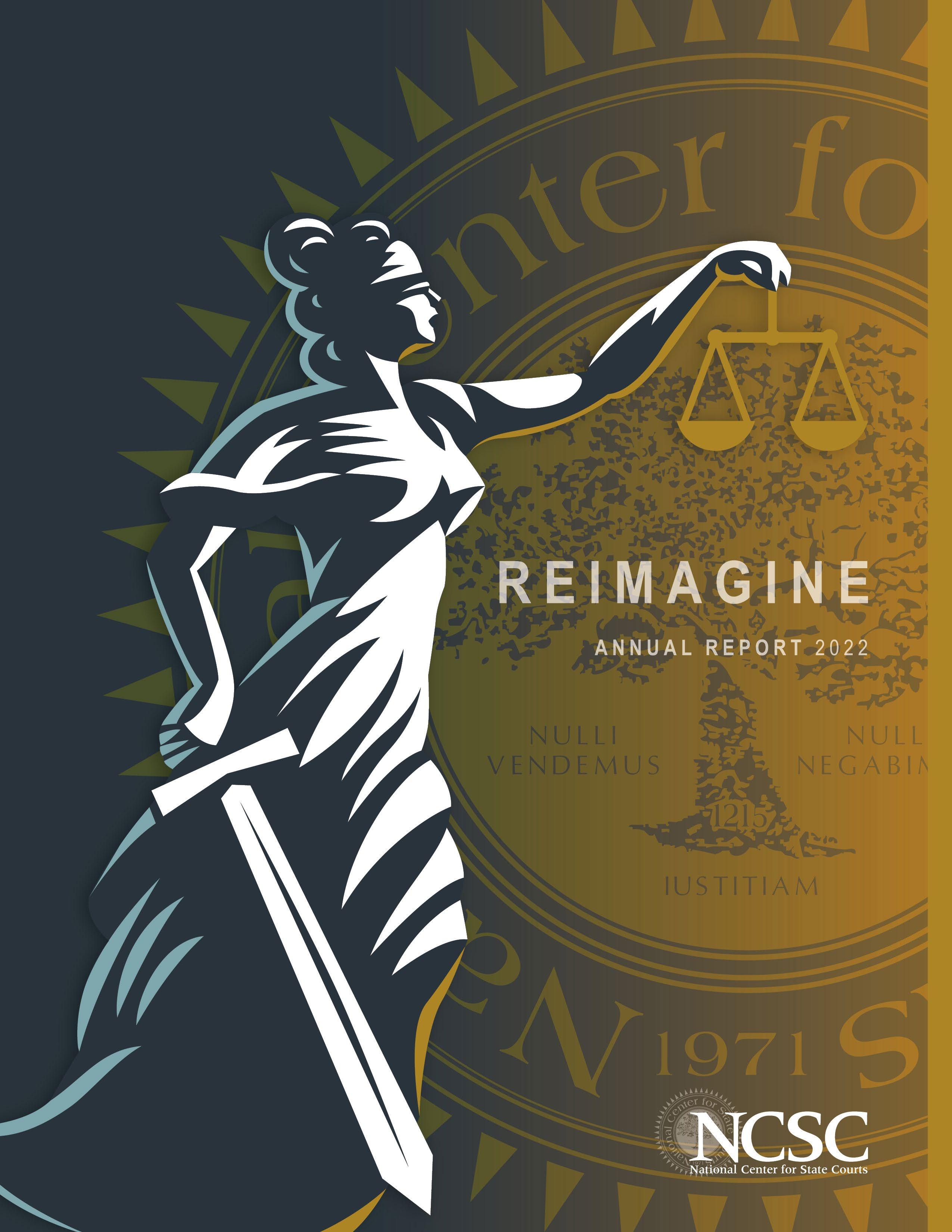
Effective August 2022
CHAIR
LORETTA H. RUSH
Chief Justice
Indiana Supreme Court Indianapolis, IN
VICE-CHAIR
KARL R. HADE
Executive Secretary
Supreme Court of Virginia Richmond, VA
BARRY P. BARBASH
Senior Counsel
Willkie Farr & Gallagher LLP
Washington, DC
ANNA BLACKBURNE-RIGSBY
Chief Judge
Court of Appeals
Washington, DC
REGINALD J. BROWN
Kirkland & Ellis LLP
Washington, DC
RUSSELL R. BROWN III
Court Administrator
Cleveland Municipal Court Cleveland, OH
CHRISTOPHER W. DELL
Ambassador (retired)
Fieldstone Africa
Washington, DC
MATTHEW B. DURRANT
Chief Justice
Supreme Court of Utah Salt Lake City, UT
JIMMIE M. EDWARDS
Lashly & Baer, P.C. St. Louis, MO
MICHAEL H. LANZA
Executive Vice President & General Counsel
Selective Insurance Group
Branchville, NJ
YOLANDA L. LEWIS
Executive Vice President, Justice & Health
Executive Director, Center for Justice & Health
Meadows Mental Health Policy Institute
Dallas, TX
MICHAEL P. MAGUIRE
Trabuco Canyon, CA
MELANIE G. MAY
Appellate Judge
Fourth District Court of Appeal
West Palm Beach, FL
EMILY MISKEL
Judge
5th Court of Appeals
Dallas, TX
CRAIG S. MORFORD
Vice President, General Counsel & Secretary Law Department
ExxonMobil Corporation
Irving, TX
ELIZABETH N. MULVEY
Libby Hoopes Brooks & Mulvey
Boston, MA
JOHN T. NOCKLEBY
Professor of Law
Susan Gurley Daniels Chair in Civil Advocacy Director, Civil Justice Program & Journalist Law School
Los Angeles, CA
REGINA deCHABERT
PETERSEN
Administrator of Courts
Judicial Branch of the Virgin Islands
St. Thomas, VI
KATHLEEN FLYNN PETERSON
Ciresi Conlin LLP
Minneapolis, MN
RICHARD J. PIERCE Judicial Programs Administrator Administrative Office of the Courts
Harrisburg, PA
THOMAS W. ROSS President (retired) Volcker Alliance, Inc. New York, NY
GREG SATTIZAHN State Court Administrator
Pierre, SD
TOKO SERITA Judge
Queens Criminal Court Kew Gardens, NY
JEFF SHORBA
State Court Administrator Minnesota Judicial Branch St. Paul, MN
PAUL A. SUTTELL
Chief Justice Supreme Court of Rhode Island Providence, RI
ERICA R. YEW Judge Superior Court Santa Clara County San Jose, CA
MARY C. MCQUEEN ex officio President National Center for State Courts Williamsburg, VA
of Contents
Inside 4 Racial Justice, Diversity, Equity and Inclusion 6 Disinformation and Civics Education 8 Mental Health 10 The Rule of Law Around the World 12 Court Administration 14 Court Leadership Development 16 Briefs Gifts of Time & Talent 18 Warren E. Burger Society 20 General Counsel Committee 21 Tribute Gifts 22 Lawyers Committee 23 Young Lawyers Committee 24 2022 Honor Roll of Contributors 25 Project Funding 25 Joan K. Cochet Memorial Scholarship 26 Friends of the Court 26 Presidents Legacy Society
Table
Board of Directors 2022-2023
President & Chair Message
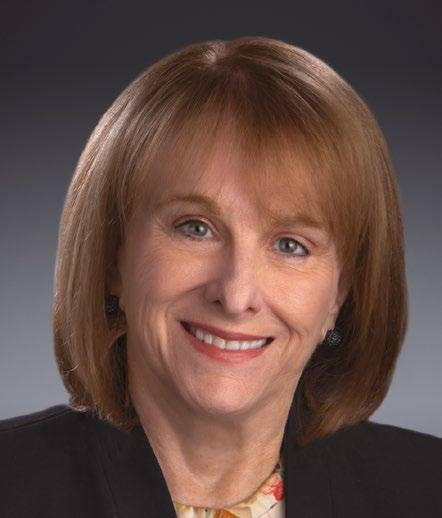
The courts’ enduring mission is to provide all those who appear before them a fair, impartial, and accessible justice system. But a traditional courthouse, with its marble columns and elaborate entry ways, can present an imposing edifice. Similarly, literature, movies, and television often provide an indelible image of how courts conduct trials: a somber courtroom, a stern judge, combative attorneys, and attentive jurors and spectators. While these features can symbolize stability and inspire reverence, courts must always ensure that they are fulfilling their mission for all individuals, which, in turn, increases public trust in both the rule of law and the judiciary.
And, as we have all seen in recent years, events have a way of forcing necessary change. For example, COVID-19 shutdowns made courts adapt and innovate to keep cases moving forward. One such innovation was to conduct hearings, jury selection, and even trials remotely. Though these remote proceedings may have started as a “temporary” solution to challenges posed by the pandemic, for many lawyers and court customers, they have become preferable to traditional, face-to-face court proceedings.
Change also extended beyond the “nuts and bolts” of court operations. Many organizations have worked fervently to highlight, for example, ways in which the justice system provides unequal treatment to people of color and to increase protection for the rights of the LGBTQ(+) community. Importantly, these movements, and many others, have forced courts to examine the presence of explicit and implicit bias not only in their processes and the law, but also in their judges and court staff.
As a result, courts across the country responded by making necessary changes to improve how they fulfill their mission for all individuals. And the National Center for State Courts (NCSC) has been a tremendous resource, providing courts with support, research, and technical assistance to tackle these challenges and others. NCSC works closely with the state courts on several initiatives, including the Blueprint for Racial Justice, the National Judicial Task Force to Examine State Courts’ Response to Mental Illness, the Justice for All Initiative, and the National Task Force on Fines, Fees, and Bail Practices. The goal in each of these endeavors is improving court operations to better serve the public.
In turbulent times, nothing is more important than the public’s trust in both the rule of law and the judiciary. This Annual Report provides a look at what NCSC and the courts are doing, both here and abroad, to reimagine themselves and improve — perhaps restore — that trust.
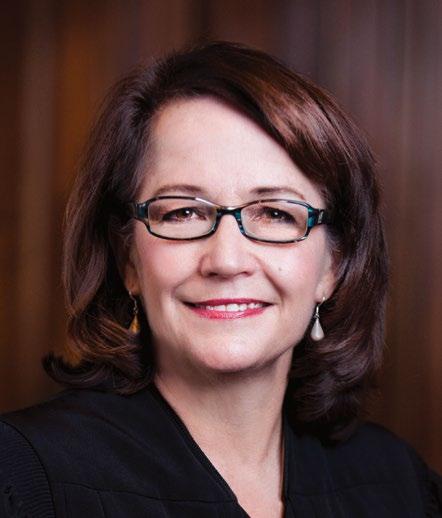
3 NCSC ANNUAL REPORT 2022
Loretta H. Rush Chief Justice Indiana Supreme Court
Mary Campbell McQueen President National Center for State Courts


LEARN MORE ncsc.org/racialjustice
Delaware Judicial Branch Diversity, Equity and Inclusion
Officer Kaelea Shaner
(right) updates State Court Administrator Gayle Lafferty on priority projects stemming from the court’s strategic plan.
Photo courtesy of the Delaware Judicial Branch
Encouraging systemic change to promote DEI
Since George Floyd’s murder in 2020, NCSC has worked to understand and address racial inequities in the justice system and enhance diversity, equity, and inclusion in state courts.
Much of this work has emanated from the Blueprint for Racial Justice, a coalition of more than 150 court leaders, staff and partners dedicated to improving racial equality by intensifying efforts to ensure all court users, litigants, and community members are heard and respected by the nation’s justice system.
The Blueprint for Racial Justice has produced tools
designed to help judges, court staff and partners promote equity in areas such as education, community engagement, data and analysis, leadership and governance, and court services. A growing number of online resources including webinars, toolkits, reports, and guides are now easily accessible to court staff and the public.
Additionally, the Blueprint for Racial Justice organized an inaugural in-person convening of DEI professionals in 2022. Staff representing more than 40 court organizations gathered in Atlanta to connect, learn, and share during a two-day meeting.
In 2021, the Delaware Supreme Court issued an administrative order to address diversity issues in the state’s legal community. More than a year later, the court is well on its way to implementing a strategic plan and recommendations developed by NCSC and AccessLex.
Through data analysis, workgroup facilitation and feedback from stakeholder interviews, NCSC and AccessLex identified barriers to diversity such as an inadequate pipeline, the state bar exam and admission, the practice of law, and the judiciary.
“The report and recommendations have been helpful in a number of ways. First, the report gave us concrete proposals to consider and discuss with members of the Delaware bench and bar. Second, those discussions resulted in a lot of detailed feedback, which is helping to shape how we approach implementing changes,” said Delaware State Court Administrator Gayle Lafferty.
Accomplishments in 2022 included:
• Hiring judicial branch DEI officer Kaelea Shaner in October 2022. Some of her initial duties include piloting conscious-inclusion training with judges, establishing a management mentorship program for employees from diverse backgrounds, and establishing a paid summer internship program.
• Updating the Delaware LawRelated Education Center governance, which included adding more diverse members. Additionally, the Delaware Supreme Court committed $1 million over the next five years to increase the number of paid staff supporting the center. Expanded funding will allow for more robust civics and law-related educational programs to help build interest in legal careers with younger students.
• Initiating the collection of race/ ethnicity/gender identity information from lawyers to help
establish a baseline for increasing the diversity of bench and bar.
• Adopting changes to the Delaware Bar Exam and admissions process that include an additional exam date each year; reductions in the overall passing score and number of essays and topics tested on; and reductions in the duration of clerkships, checklist activities, and late application fee.
• Participating in the Blueprint for Racial Justice CORA (Court Opportunity Recruitment for All) project to encourage students from across the country to apply for clerkships, internships, and externships in the Delaware Judicial Branch.
For a deeper dive into Delaware’s diversity efforts, watch the project video, or read the Improving Diversity in the Delaware Bench and Bar Strategic Plan Report and Recommendations at ncsc.org/ racialjustice.
5 NCSC ANNUAL REPORT 2022
REIMAGINING
RACIAL JUSTICE, DIVERSITY, EQUITY AND INCLUSION
Improving diversity in the Delaware bench and bar
Disarming disinformation by building public trust and confidence
Did you know that the United States justice system has been systematically targeted on social media by Russian propaganda efforts? One study by the Center for Strategic and International Studies (CSIS) suggests that over 4,000 Russian-controlled social media accounts (and the bots that are used to amplify those messages) sent nearly 10 million tweets criticizing courts and other justice system actors in the United States. Those tweets often look and sound like authentic communications from U.S. citizens—making the challenge to unmask them even more daunting.

For nearly five years, NCSC has been at the epicenter of a partnership to build awareness of — and resilience to — this serious threat to public trust and confidence in the state courts. This project has included hosting in-person and virtual workshops, researching public attitudes toward such threats and developing messaging, and convening court leaders to help states proactively build action plans.
Over the course of the last year, the campaign stepped up even further. Working with colleagues at CSIS and the Brunswick Group, a global critical issues consulting firm, NCSC developed a “Disinformation Playbook” to help ready courts for incoming threats. The National Center for State Courts also hosted two webinars and worked with the Conference of Court Public Information Officers (CCPIO) to elevate the issue nationally.
The work doesn’t end there. In the summer of
2022, the Conference of Chief Justices (CCJ) and Conference of State Court Administrators (COSCA) adopted a policy resolution to “support and urge the National Center for State Courts to continue its active efforts to monitor, catalogue, and report on disinformation attacks on courts and judges across the states in order to maintain public trust and confidence.”
In the fall, COSCA published a policy paper entitled “Courting Public Trust and Confidence: Effective Communication in the Digital Age,” with tips for courts to establish themselves as a trusted source for information through timely, accurate and understandable communication. In particular, the paper suggests that courts need to break away from traditional responses such as silence, allowing orders/ opinions to speak for themselves, an indirect response through a proxy, and limiting public information officers to “no comment” replies.
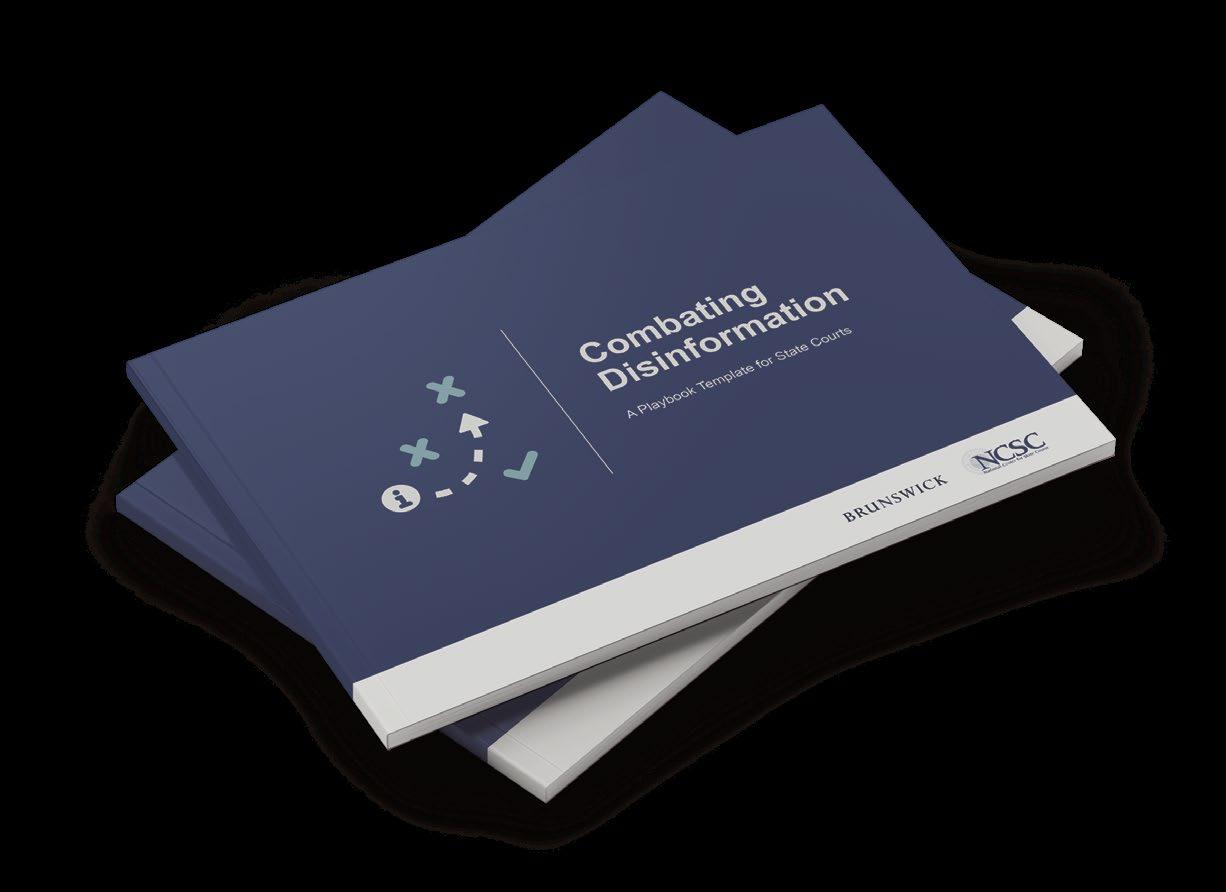
Elevating civics education with youth
For nearly a decade, NCSC’s Civics Education Essay Contest has given elementary, middle, and high school students a chance to express their thoughts about the importance of our system of government and the framework on which it was founded. The annual contest started small but has scaled-up significantly in recent years. In 2022, over 2,700 students from 49 states, the District of Columbia, and 19 countries submitted entries to answer this question: “Which Amendment to the U.S. Constitution has made the biggest difference in people’s lives?” In case you are wondering which amendments students deemed most important: of the nine winners, several selected the 14th or 15th amendments. Read about the winners and their stories at ncsc.org/contest.
LEARN MORE ncsc.org/disinformation REIMAGINING DISINFORMATION AND CIVICS EDUCATION
G. Thomas Munsterman Award for Jury Innovation
District Court Judge Thomas Kelly Ryan of Johnson County, Kansas, was honored with the G. Thomas Munsterman Award for Jury Innovation for his efforts to engage with the public to develop a jury process that would address public health concerns while also protecting constitutional rights and resolving pending cases.
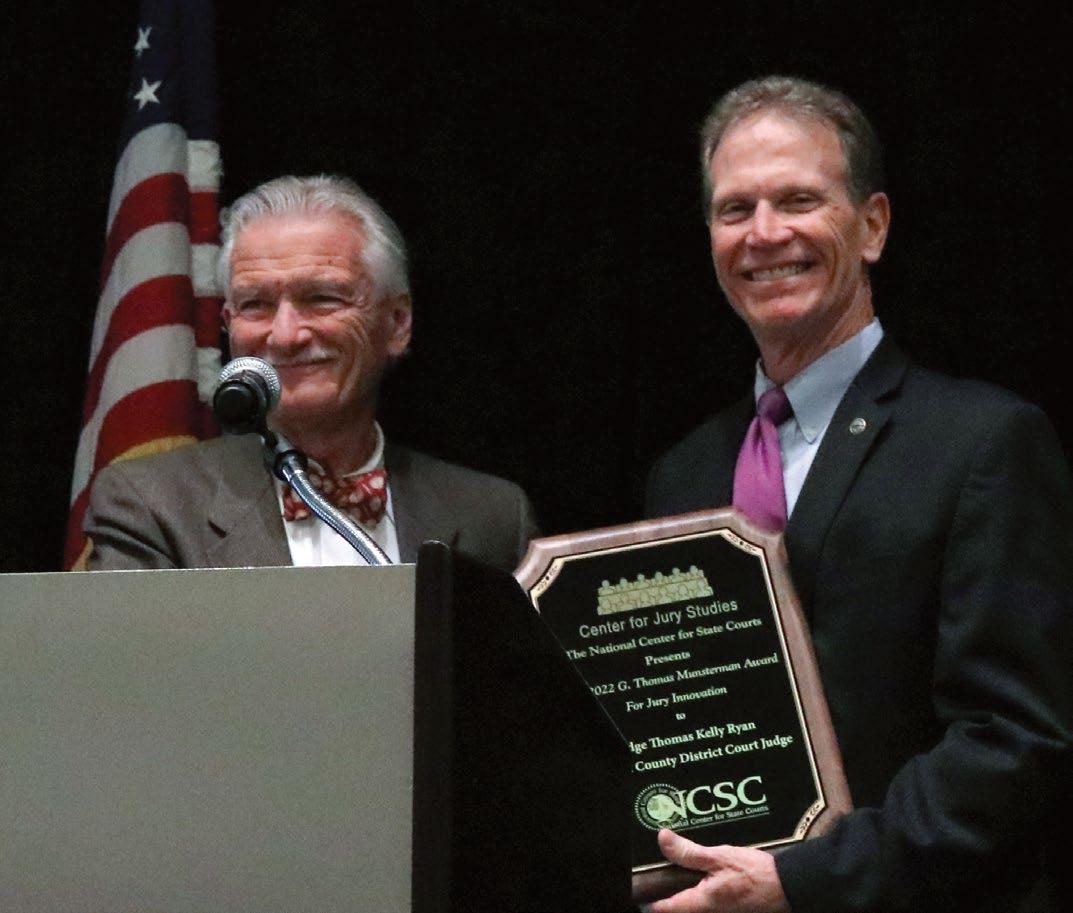
Named for the founder and former director of NCSC’s Center for Jury Studies, G. Thomas Munsterman, the award recognizes states, local courts, organizations, and individuals that have made significant improvements or innovations in jury procedures, operations, and practices.
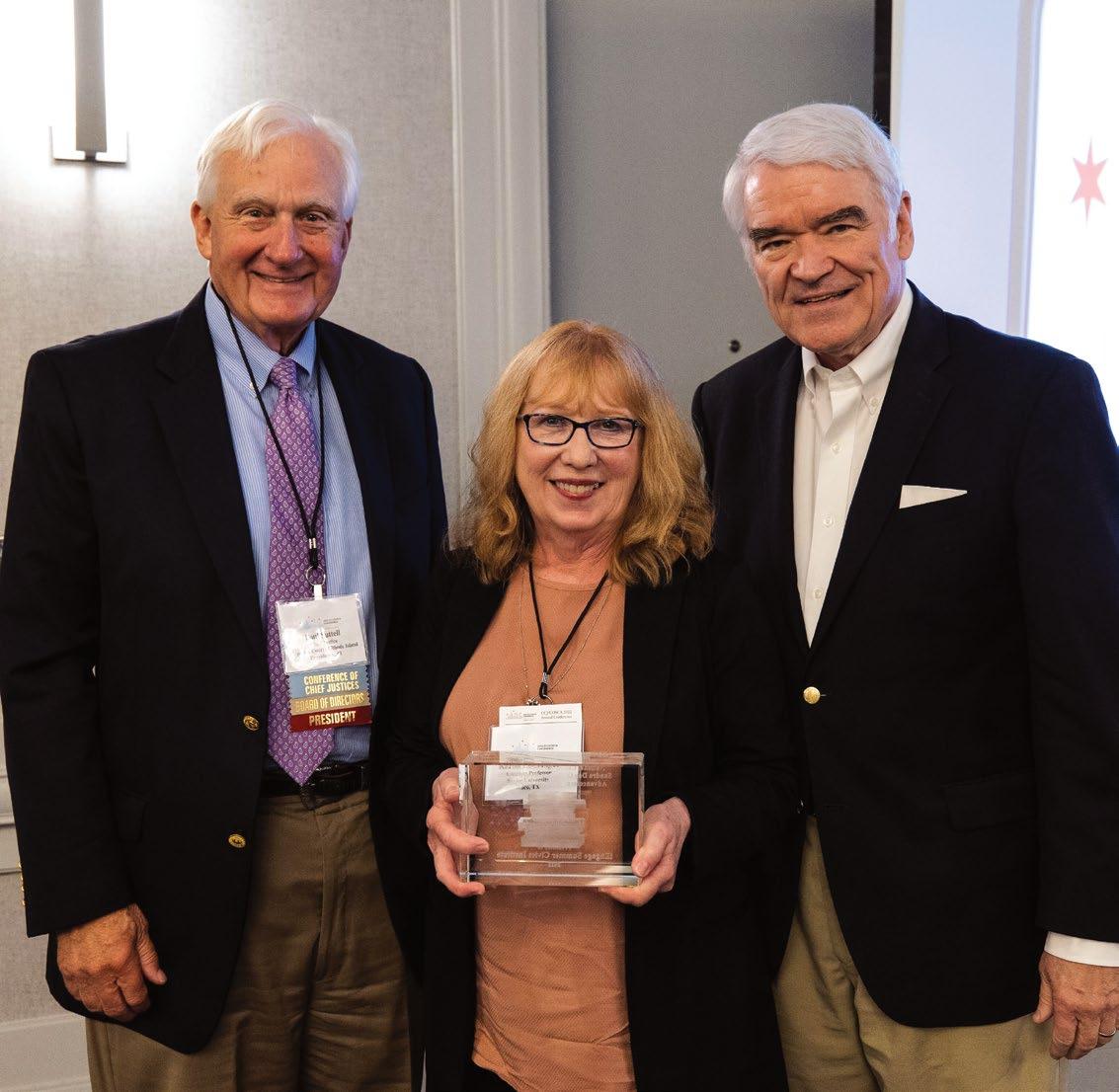
During the height of the pandemic, Judge Ryan connected with the local PBS station to invite randomly identified individuals to share their pandemic-related reservations about jury service. The participants viewed a video of the judge explaining the process and safety precautions in place. He also answered questions from the participants to better understand their concerns.
Sandra Day O’Connor Award for the Advancement of Civics Education
Each year, NCSC awards the Sandra Day O’Connor Award for the Advancement of Civics Education. This award recognizes an organization, court, program, or individual who has promoted, inspired, improved, or led an innovation or accomplishment in the field of civics education related to the justice system. The 2022 recipient was the iEngage Summer Civics Institute at Baylor University. Founded in 2013, the Baylor iEngage Summer Civics Institute is a free, five-day civics camp designed to help middle school students learn how to make a difference in their schools, neighborhoods, and communities.
7 NCSC ANNUAL REPORT 2022
(From left) Retired Judge Gregory E. Mize presents District Court Judge Thomas Kelly Ryan with the 2022 G. Thomas Munsterman Award for Jury Innovation.
Pictured: Karon LeCompte, Ph.D., of the iEngage Summer Civics Institute at Baylor University, receives the 2022 Sandra Day O’Connor Award for the Advancement of Civics Education from Rhode Island Supreme Court Chief Justice Paul A. Suttell (left) and Texas Supreme Court Chief Justice Nathan Hecht (right).
New approaches for supporting the “Bills” in our communities
 By Circuit Judge Nan G. Waller Multnomah County, Oregon
By Circuit Judge Nan G. Waller Multnomah County, Oregon
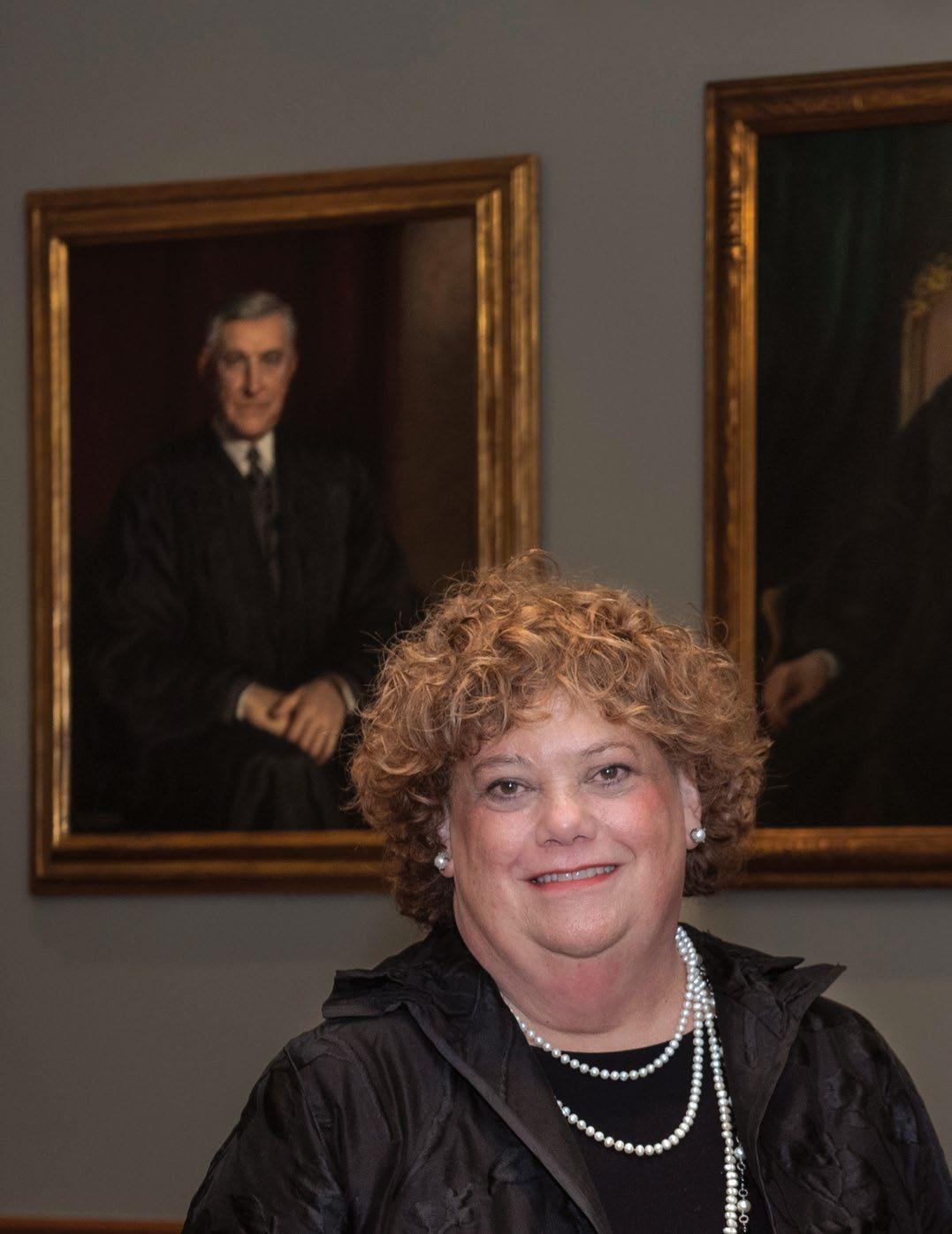
Ihave a probationer, Bill, who came to court one day in the cold of winter even though he had no hearing. He begged to be taken into jail because he was, in his words, “in every kind of crisis.” He was exhausted, dehydrated, cold and hungry. He had lost his medication that helped calm his mind. He broke down in tears, begging to go to jail, when I gently explained that I had no basis to take him into custody. There were no doors open to him to address his mental illness, his substance abuse, his lack of housing and his hunger. That day we did our best — we gave Bill food and water and made calls to find him help.
While Bill’s visit didn’t fit into the typical use of a courtroom and a judge, there are lessons to learn from his story. We have invested significant (although not nearly sufficient) resources into the behavioral health system. Too often, however, those in the criminal justice system with behavioral health issues are literally left out in the cold when programs and housing reject them because of the acuity of their symptoms or the stigma of having criminal charges. The Bills in our communities, in the eyes of many, are simply a problem, a nuisance who need to be off the streets. Bill continues to show up for court regularly not because we are armed with solutions but because we recognize Bill’s humanity and in doing so provide Bill with the dignity and hope that he needs to keep going. This is the power of procedural justice.
There are days when it has felt like I am presiding over dockets of despair given the lack of options for
the individuals appearing before me. I have had the privilege, however, of working on the National Task Force to Examine State Courts’ Response to Mental Illness over the past two years. The Task Force has just released its final report to help judges lead change at the complicated intersection of the courts and mental illness.
My hope for the future is that we will fully implement the recommendations of the Task Force and in doing so a chorus of voices across the country will lead to true change by developing a comprehensive system of care with appropriate off ramps from the criminal justice system, by improving access to treatment and by allowing all of us to see individuals driven into the justice system by their mental illness for their humanity and not through the veil of stigma. That is my lesson of hope from Bill and from the work of the Task Force.
REIMAGINING MENTAL HEALTH LEARN MORE ncsc.org/behavioralhealth
Adapted from Judge Waller’s remarks at the William H. Rehnquist Award dinner at the Supreme Court of the United States on November 17, 2022.
William H. Rehnquist Award for Judicial Excellence
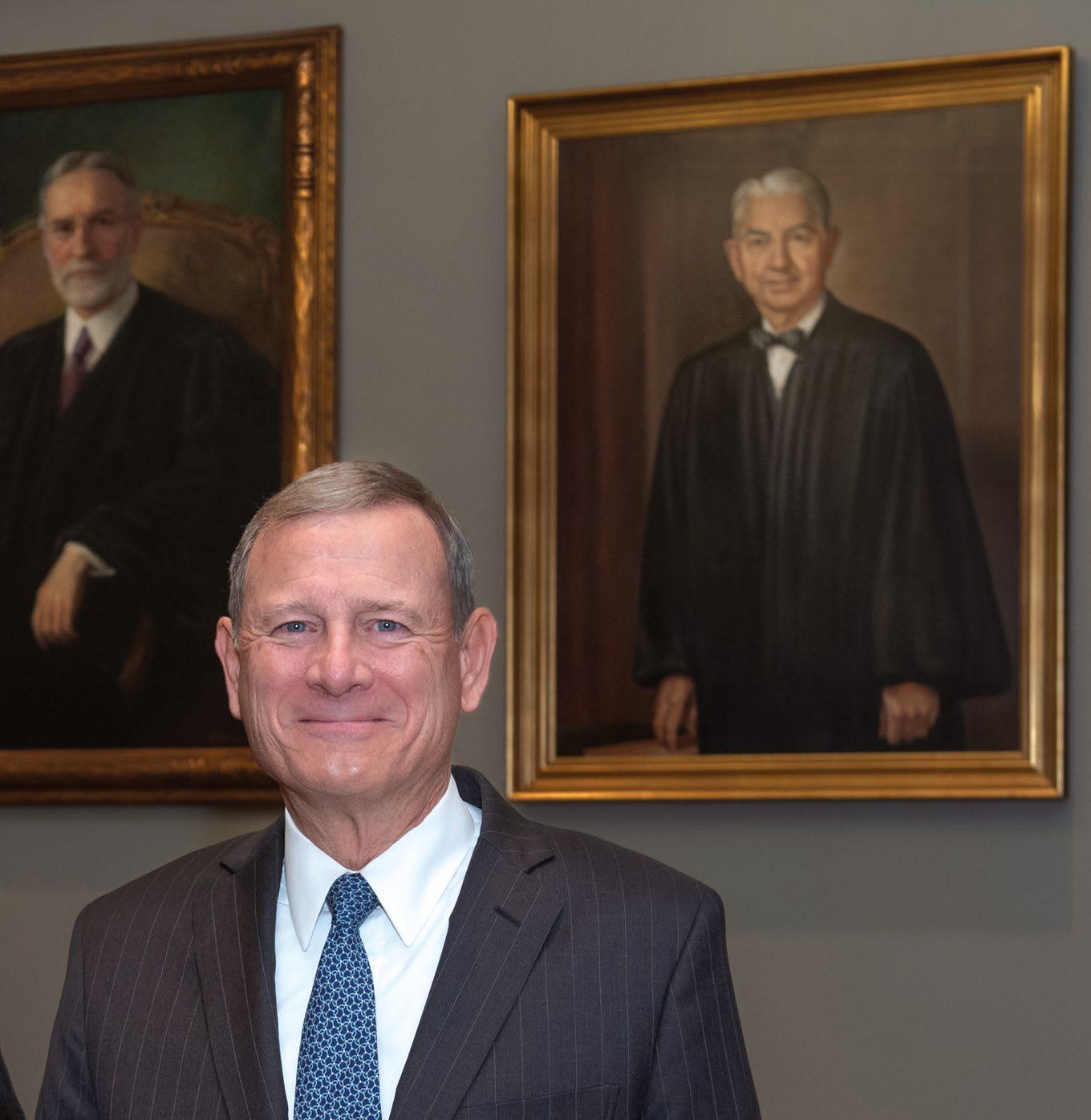
Multnomah County Circuit Judge Nan G. Waller is the recipient of the 27th Annual William H. Rehnquist Award for Judicial Excellence. One of the highest judicial recognitions in the country, the Rehnquist award honors a state court judge who demonstrates the outstanding qualities of judicial excellence, including integrity, fairness, open-mindedness, knowledge of the law, professional ethics, creativity, sound judgment, intellectual courage, and decisiveness.
Judge Waller — who has a rich history of judicial and legal service at the local, state, and national levels — was recognized for numerous contributions that include developing innovative approaches to family law, mental health, and equity and racial disparity; and adopting new ways of thinking about statewide electronic filing and case management and courthouse planning.
RESPONDING TO MENTAL ILLNESS
Task force issues recommendations for courts
Understanding the critical need to identify new ways to address the needs of court involved individuals with severe mental illness, NCSC facilitated a multi-year study by the National Judicial Task Force to Examine State Courts’ Response to Mental Illness that concluded in 2022.
The task force of more than 40 judges, court leaders, and behavioral health experts released findings and recommendations that encouraged state courts to:
• Convene justice and behavioral health system partners to identify opportunities to collaboratively improve responses to individuals with behavioral health disorders.
• Promote processes to identify and divert individuals with behavioral health disorders at every stage of system involvement toward treatment and away from further penetration into the criminal justice system.
• Examine current case management and calendaring practices and implement strategies to more quickly and effectively address issues presented in cases involving individuals with behavioral health needs.
NCSC is now working with pilot courts to test task force recommendations to more fully understand the complexities of planning and implementing mental health diversion in local communities.
Visit ncsc.org/behavioralhealth to watch the recording of the virtual launch webinar with judges and mental health experts and download a copy of the final report and recommendations.
9 NCSC ANNUAL REPORT 2022
Multnomah County Circuit Judge Nan G. Waller (left) received the William H. Rehnquist Award for Judicial Excellence from Chief Justice of the United States John G. Roberts, Jr., at the U.S. Supreme Court in November.
Photo courtesy of the Supreme Court of the United States
Strengthening global justice institutions through collaboration

Beyond the United States, NCSC is strengthening democratic institutions and the rule of law in post-conflict societies and developing democracies through relationships with donor agencies, host-country governments, and nongovernmental organizations.
The International Programs Division engages in program management, proposal development, staff recruitment, and strategic engagement to deepen our partnerships in more than 30 countries throughout
Eastern Europe, Asia, the Middle East and North Africa, Latin America, and the Caribbean. NCSC also maintains an active role in the international court community through involvement in organizations including the International Association for Court Administration and International Organization for Judicial Training.
Since its inception in 1992, the division has developed a number of long-standing relationships with court systems including ones in Bangladesh and Tunisia.
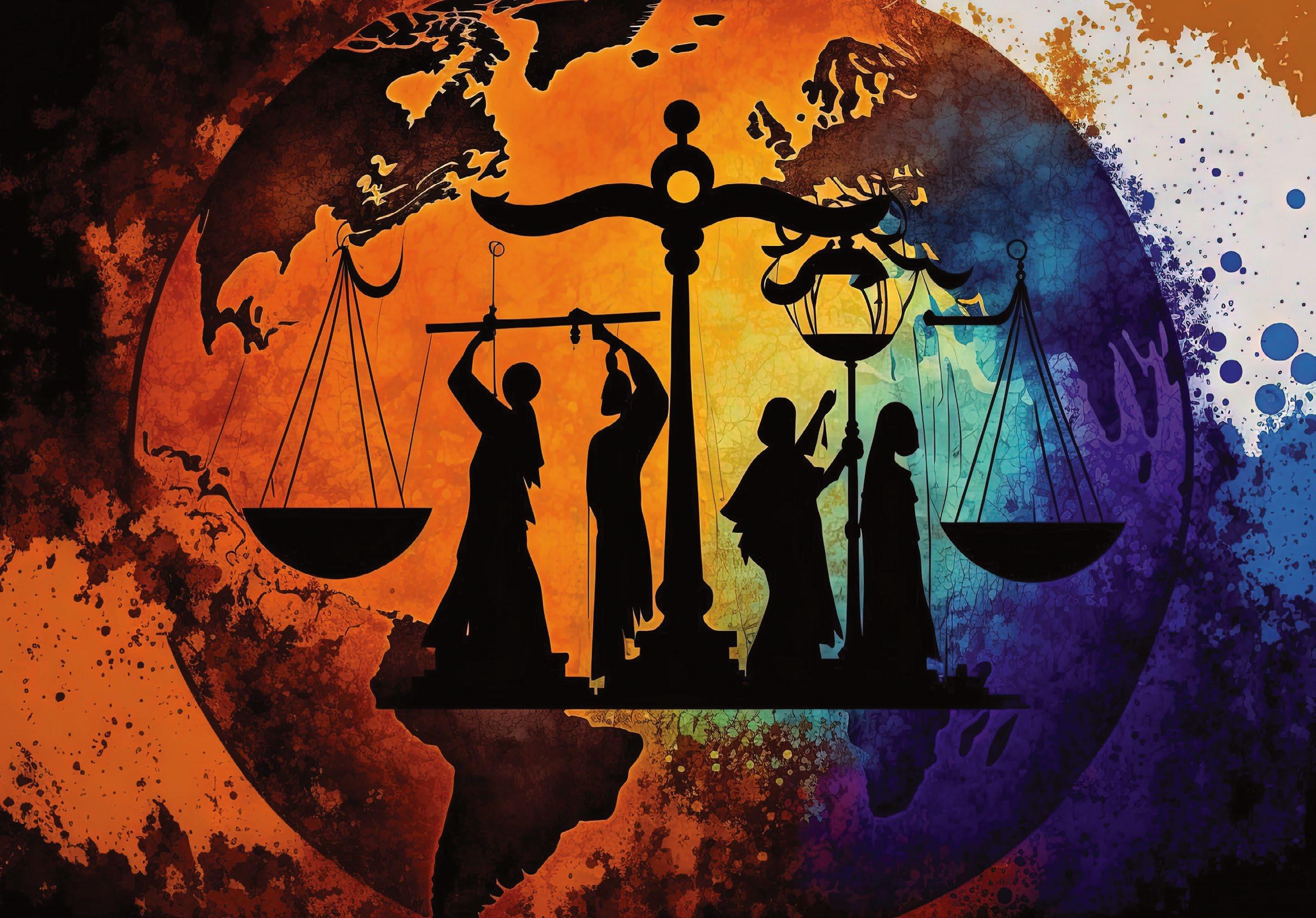
LEARN MORE ncscinternational.org REIMAGINING THE RULE OF LAW AROUND THE WORLD
Bangladesh
For years, NCSC has worked in Bangladesh to strengthen the capacity of courts to manage and adjudicate terrorism cases and complex financial crimes by increasing awareness of international best practices, delivering trainings and improving case management.
In 2022, NCSC organized virtual trainings for 263 judges, prosecutors, and court staff to address topics including caseflow management, digital evidence and court administration. This instruction equipped participants with applicable skills training, case study exercises and a forum for discussion and collaboration.
Additionally, NCSC has worked to improve access to justice by procuring audio/visual equipment to improve the court user experience and providing training and resources to panel lawyers and clients to increase awareness of legal aid services. Awareness events have reached nearly 12,500 citizens through more than 700 activities that included courtyard meetings, cultural events, and public hearings. Contact with an additional 4.2 million citizens occurred during mobile events.
Tunisia
In 2022, NCSC continued work in Tunisia on several court administration, modernization and anti-corruption projects.
To increase accountability, the center is providing technical assistance and
training for adjudicating corruption and complex financial crimes cases. The work has focused on improving the prevention, detection, investigation, and prosecution of corruption cases; strengthening asset declaration and whistleblower protection; increasing capacity and operations of public controllers and the court; increasing transparency and efficiency of registration processes; and supporting the establishment of a constitutional court.
NCSC also initiated a series of IT procurements to support the court’s decentralization and digitalization, including the creation of new regional chambers, installation of courtrooms in regional chambers, setup of training rooms and a computer lab, and the development of an electronic platform to automate case management and annual programming and reporting.
Global
In addition to individual court projects, NCSC is developing tools to address broad global concerns like the Mitigating Bias and Countering Discrimination Training Development Program. These training materials will educate international criminal justice actors on understanding and recognizing how implicit and explicit biases and discrimination can occur in their criminal justice systems and identifying actions they can take to mitigate their impact. Ultimately, the program aims to improve the experiences of individuals engaging with, entering in, and processing through the criminal justice system around the world.
Global Impact
Active rule of law projects
More than 1,000 persons trained by NCSC experts and trainers
More than 50,000 individuals reached in NCSC-supported community events
Bangladesh citizens contacted during mobile awareness events
11 NCSC ANNUAL REPORT 2022
Advancing long-term adoption of hybrid and remote hearings

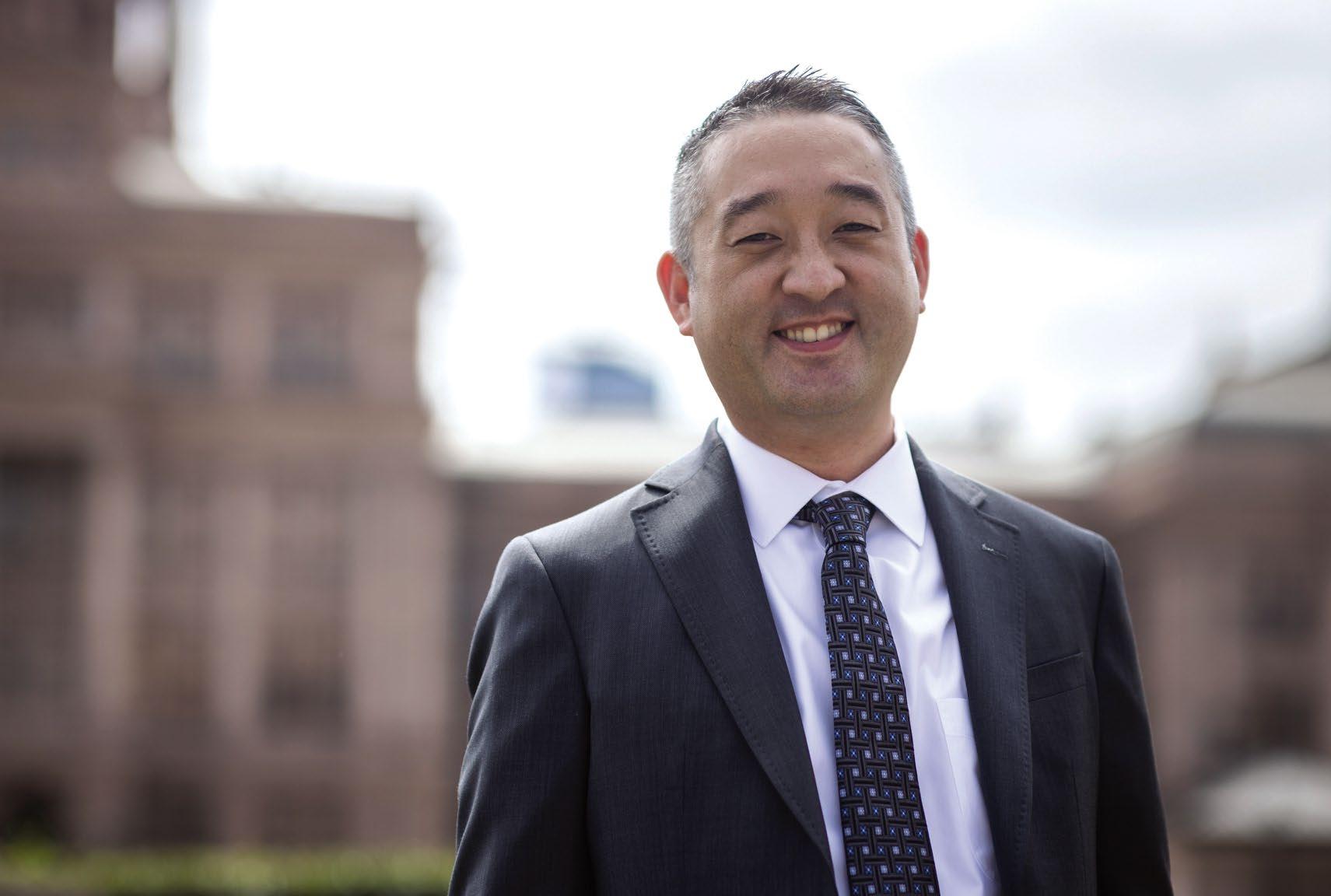
As “normal” operations resume, many courts are evaluating the successes and failures of remote hearings. They’re also looking at opportunities for increased access to justice as emphasis shifts from physical court locations to virtual public participation and delivery of court services.
Tapping into subject-matter experts and drawing from the national court community, NCSC has produced a wealth of webinars, toolkits, and guides on remote and hybrid hearings that cover a variety of topics that address policies and procedures, guiding principles, and technology.
In the field, NCSC has partnered with dozens of courts as part of the Hybrid Hearings Improvement Initiative. Pilot sites in 12 states are working with NCSC staff to identify technical and operational solutions to improve hybrid hearings in these local jurisdictions. NCSC also facilitated implementation labs with more than 60 additional courts to test approaches and develop best practices and lessons learned.
Insights from these courts and NCSC’s technology partners will inform updated guidelines and best practices that can be adapted for all types of proceedings and technology infrastructures.
Jeffrey Tsunekawa and the Texas Office of Court Administration are using remote hearing data and insights to help courts accommodate both in-person and remote attendees.
LEARN MORE ncsc.org/hybridhearings REIMAGINING COURT ADMINISTRATION
Photo courtesy of Texas Office of Court Administration
Warren E. Burger Award for Excellence in Court Administration
Longtime Lane County (Ore.) Trial Court Administrator Liz Rambo has been named the recipient of the Warren E. Burger Award for Excellence in Court Administration. Rambo has been the trial court administrator in Lane County Circuit Court in Eugene since 2008.

A 35-year employee of the Oregon Judicial Department, Rambo is known for her leadership, innovation and mentorship. Locally, she developed a model Pretrial Release Program that has been adopted statewide. She also worked closely with county leaders to complete a six-year project to retrofit the courthouse to ensure it was ADA accessible.
Beyond Lane County, Rambo actively participates on several statewide court committees, including service as the vice chair of data governance advisory committee.
The Warren E. Burger Award for Excellence in Court Administration is named for the late chief justice of the United States, who was instrumental in founding NCSC and its Institute for Court Management. The recognition honors individuals who make significant contributions to the field of court administration through management and administration, education and training, or research and consulting.
Virtual hearings take longer, but
Early into the pandemic, leaders in Texas recognized the potential of adopting remote hearings on a more permanent basis. Yet many questions remained, and data needed to be captured in a timely manner to inform future decisions.
Working with NCSC, the Texas Office of Court Administration set out to answer these questions in the first national review of remote hearings data. The 12-month study analyzed both 1.25 million minutes of judicial data and focus group feedback from judges and court leaders in eight counties across Texas.
The report found that remote proceedings take about a third longer than in-person hearings but also provide increased access to justice as litigants can more easily attend and participate in hearings. The additional hearing time was largely attributed to technology-related issues and lack of preparation by participants — both which can be addressed through a series of recommendations, which include:
• Hiring “technology bailiffs” who can prepare remote participants for their hearings and handle technology glitches.
• Creating guidelines to determine which hearings should be in-person or remote.
• Scheduling hearings efficiently while also considering litigant participation.
increase access
• Ensuring paperwork is completed before hearings begin.
• Providing easily accessible systems for participant use.
• Encouraging judges to take breaks between hearings.
“The option to participate in a court hearing remotely continues to be overwhelmingly supported by the public,” said Jeffrey Tsunekawa, director of research and court services for the Texas Office of Court Administration. “It’s a major step forward in the area of access to justice.”
Administratively, the Texas Supreme Court has issued a final order and approved new and amended rules to further define how and when remote proceedings may occur.
Today, Tsunekawa said Texas courts are still working through courtroom design logistics and technical equipment requirements to best accommodate attendees both in-person and remotely.
“There is no perfect solution, but there are definitely increased options,” he said.
13 NCSC ANNUAL REPORT 2022
Liz Rambo
LEARN MORE ncsc.org/txremote
REMOTE HEARINGS IN TEXAS COURTS
Growing court leadership development opportunities both in-person and online

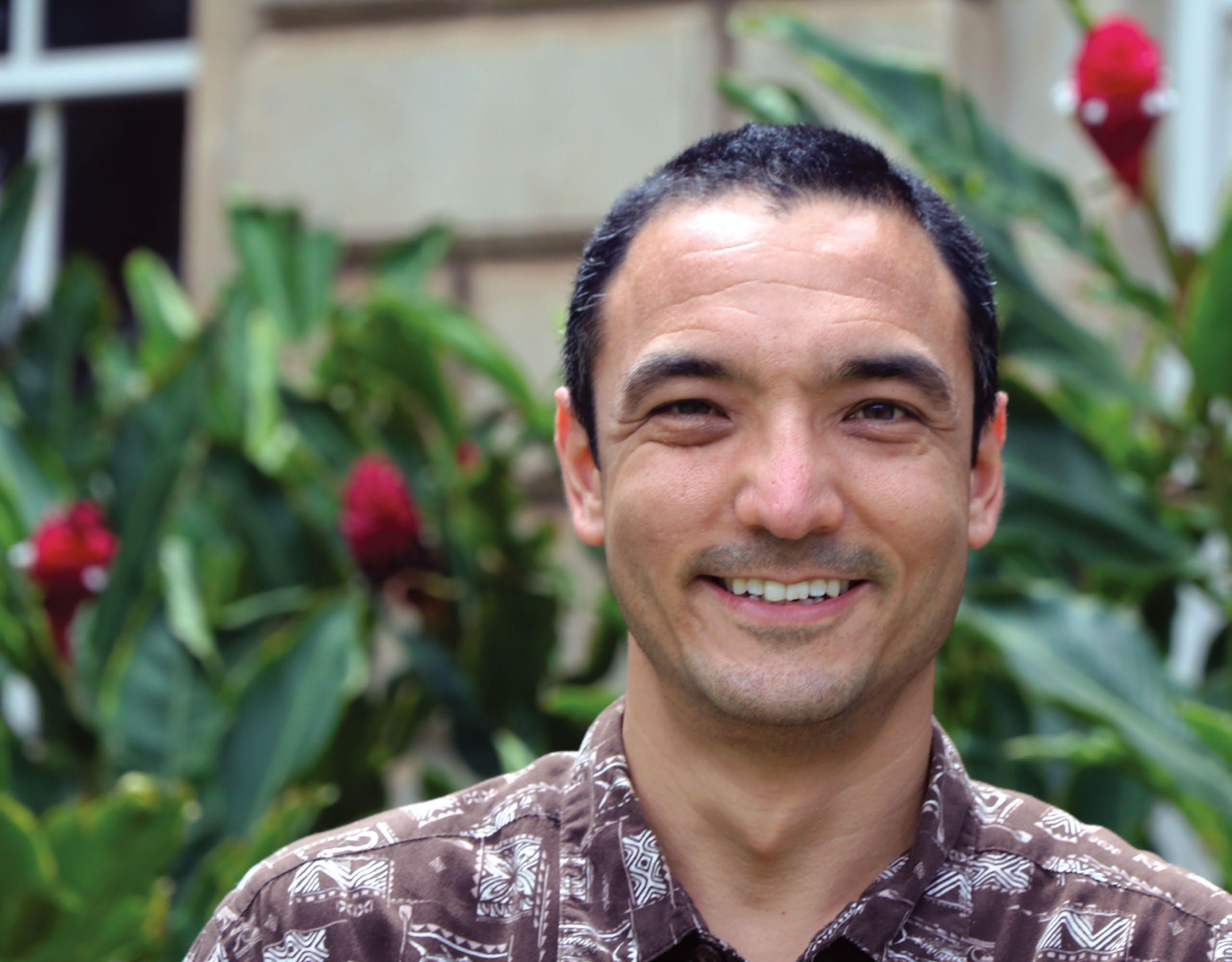
Since 1970, the Institute for Court Management has delivered training and education to judicial branch personnel in emerging areas of court leadership and management concepts, case management, human resources management, court performance standards, and other areas deemed critical to professional development.
Its flagship experience, the ICM Fellows program, is its highest level of certification and demonstrates a court professional’s advanced knowledge of a broad range of court administration and leadership topics and skills — culminating in a final research project, panel presentation, and graduation ceremony at the Supreme Court of the United States. It has graduated
LEARN MORE ncsc.org/icm REIMAGINING COURT LEADERSHIP DEVELOPMENT
over 1,300 members from across the country, and internationally.
The pandemic forced the Fellows program to go virtual. Now, ICM is embracing lessons learned to update its rigorous professional development program — which means maximizing the benefits of distance learning, while also looking for ways to reap the benefits of in-person collaboration. The Fellows 50th class —which graduated in 2022 — lined up with some of the biggest challenges presented by the pandemic. As a result, much of the program was held virtually. Students from across six time zones — the Caribbean, Alaska, California, Hawaii, Maryland, Nevada, and North Dakota — graduated from the
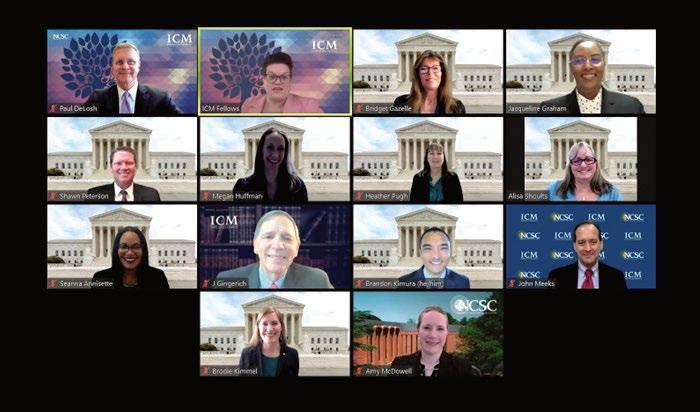
program, without those students coming together in person a single time. All learning was done virtually.
“The ICM Fellows program was a tremendous experience,” said Brandon Kimura, a graduating student from Honolulu who serves as the deputy administrative director of the Hawai’i State Judiciary. “As an all-virtual cohort, we were able to — and circumstances required us to — engage each other at a quick pace for quick feedback. This lent itself to informal communications, which led us to quickly build relationships. Nevertheless, that the pandemic understandably precluded us from spending time face-to-face was unfortunate.”
ICM has taken lessons from the pandemic to heart. New participants will now progress through the ICM Fellows program on a single track — with all candidates having completed both the certified court manager and certified court executive certifications in advance. However, to deepen bonds and relationships within the cohort, participants will resume spending time at NCSC headquarters in Williamsburg for activities with NCSC leadership and research staff, and will again gather at the end of their program for graduation at the Supreme Court of the United States.
The hybrid approach appeals to court leaders like Kimura.
“ICM’s incredible content and the benefits of learning and networking with colleagues in other jurisdictions has been invaluable to our team — all with great savings of travel time and funding,” he said.

15 NCSC ANNUAL REPORT 2022
“ ICM’S INCREDIBLE CONTENT AND THE BENEFITS OF LEARNING AND NETWORKING WITH COLLEAGUES IN OTHER JURISDICTIONS HAS BEEN INVALUABLE TO OUR TEAM — ALL WITH GREAT SAVINGS OF TRAVEL TIME AND FUNDING.”
— BRANDON KIMURA Deputy Administrative Director of
the
Hawai’i State Judiciary
Eviction diversion initiative helps courts reimagine evictions
In 2022, NCSC expanded its ongoing eviction diversion work with the launch of the Eviction Diversion Initiative. This four-year grant program provides state and local courts with funding for dedicated court staff and technical assistance and support from NCSC to advance their efforts to create holistic, sustainable, and community-driven resolutions to housing problems. A $10 million grant from the Wells Fargo Foundation helped NCSC begin its work in 12 jurisdictions with additional sites anticipated in 2023.
“The work of the first EDI cohort has been nothing short of transformative,” said Samira Nazem, an NCSC principal court management consultant. “The EDI facilitators have been able to reposition longstanding court processes as opportunities for landlords and tenants to access the legal, financial, and supportive services they need to leave the courthouse in a better position than when they started.”

16
BRIEFS
(From left) Chief Judge Anita Josey-Herring of the DC Superior Court, Judge Kimberly Bacon of the Lawrence Township Small Claims Court in Marion County (Ind.), and Nikki Del Casale, a tenant organizer, share the impact of evictions in their communities during NCSC’s Eviction Diversion Initiative announcement in Washington, D.C.
Expanding access offerings to support justice for all
Everyone who comes to court has the right to be heard. All too often, the biggest barrier to being heard is the court itself. Many litigants are confounded and discouraged by complex court processes and the dense legal language of court forms.
Simplifying court processes and paperwork is essential to improving both access to justice for all litigants and court efficiency NCSC’s Forms Camp, which debuted in 2022, offered free webinars that provided guidance from national experts and hands-on workshops to simplify and improve court forms.
Using plain language is also critical to ensuring greater access to court services. NCSC’s interactive plain language glossary helps courts identify ways to better communicate legal terms and activities to the general public.
NCSC’s Tiny Chats video series continues to focus on what courts are doing to improve public access to justice. Topics have included e-filing for self-represented litigants, procedural fairness, and plain language.
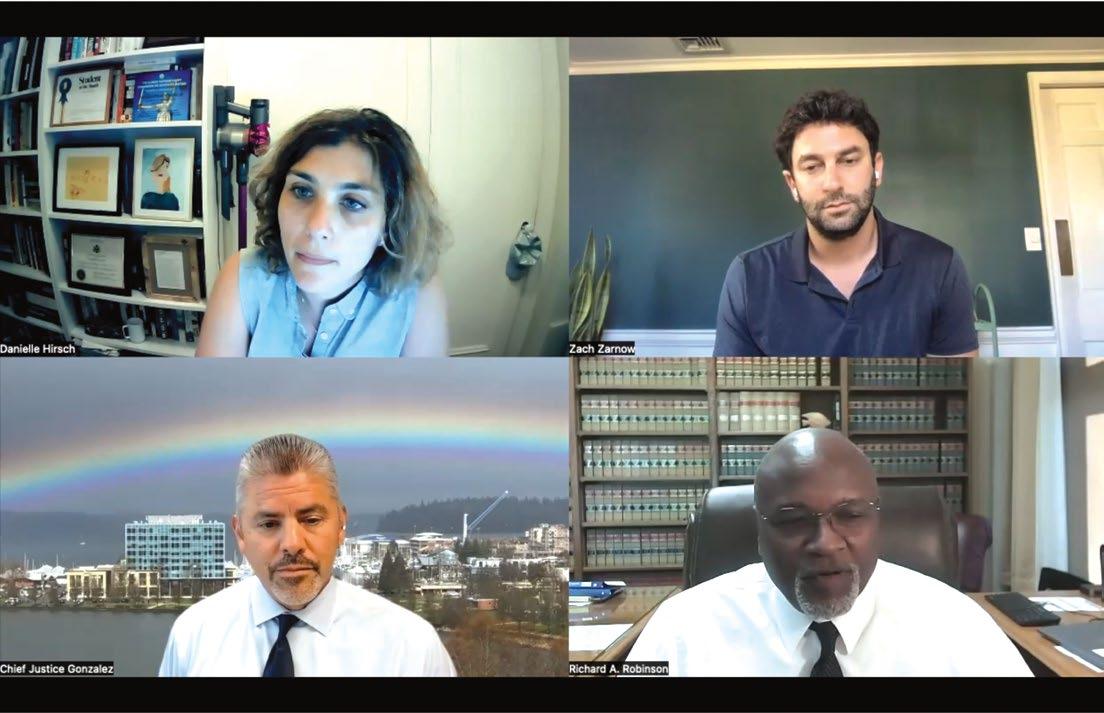
Preparing courts to be “future-ready”
The Just Horizons initiative has spent the past few years examining and testing a variety of vulnerabilities and scenarios to develop guidance and actionable resources and tools designed to ensure state courts are “future-ready.” The council identified 13 drivers of change and six areas of vulnerability that courts must be prepared to address to successfully deliver high-quality justice in the years to come.
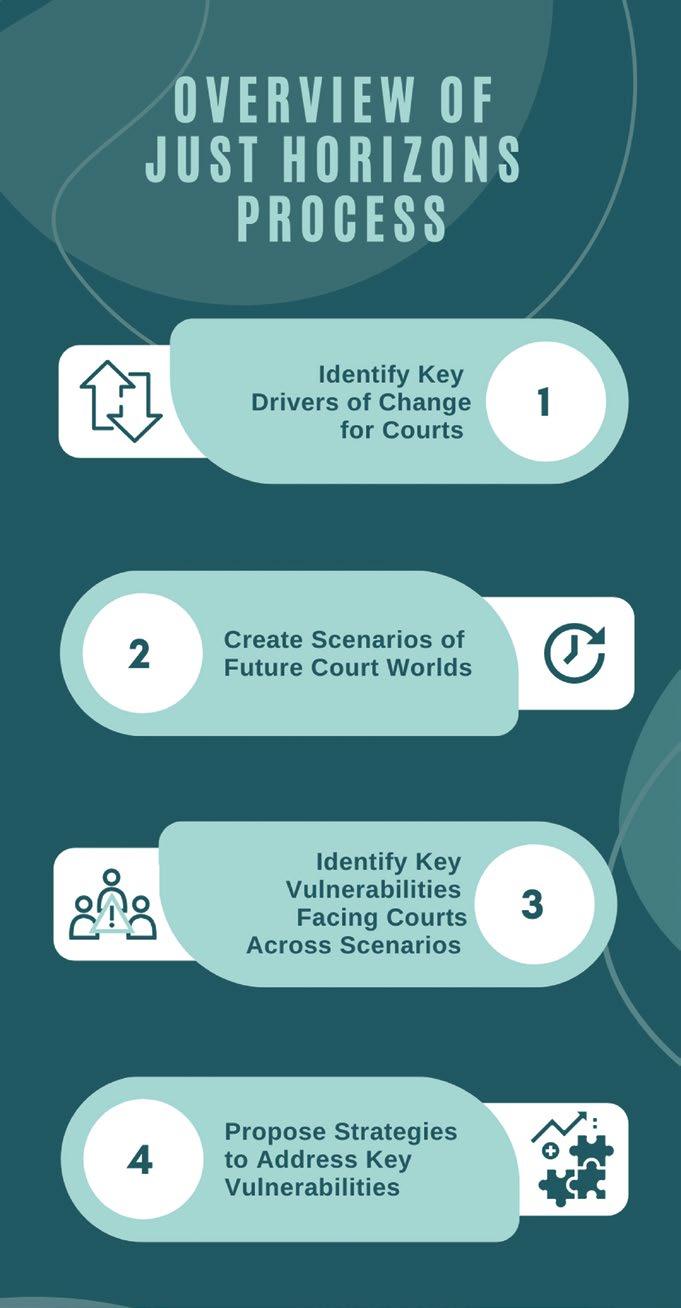
The vulnerabilities identified are:
• Including a forward-looking, anticipatory capacity in court governance
• Focusing on user-centered experience and inclusive design
• Embracing a data-driven mindset
• Understanding the role of private entities in court work
• Preparing for emergencies
• Cultivating a future-ready workforce and workplace
17 NCSC ANNUAL REPORT 2022
LEARN MORE ncsc.org/justhorizons DISCOVER MORE RESOURCES ncsc.org/a2j
(From left, top) Tiny Chat hosts Danielle Hirsch and Zach Zarnow explore access to justice issues with national court leaders and experts, including (from left, bottom) Washington Chief Justice Steven C. González and Connecticut Chief Justice Richard A. Robinson.
WARREN E. BURGER SOCIETY
The National Center for State Courts’ Warren E. Burger Society honors those who have volunteered their time, talent, and support to NCSC in exceptional ways.
The Burger Society is named for the former Chief Justice of the U.S. Supreme Court who helped found NCSC in 1971. We are proud to recognize the following society members.
JOHN F. KAY, JR.*
JUDITH S. KAYE*
INGO KEILITZ
SUSAN KEILITZ
ELISABETH H. KIEL
HENRY L. KING*
AUGUSTUS B. KINGSOLVING*
MICHAEL H. LANZA
ALPHONSE F. LAPORTA
HARRY O. LAWSON*
JAQUELINE LEWIS
ROBERT D. LEWIS*
JONATHAN LIPPMAN
ROBERT A. ARMITAGE
R. BYRON ATTRIDGE
STEPHEN H. BAKER
S. JACK BALAGIA, JR.
ROBERT N. BALDWIN
CURTIS H. BARNETTE
LUTHER J. BATTISTE III
DOROTHY T. BEASLEY
DAVID J. BECK
DANIEL J. BECKER
ROBERT M. BELL
HOWARD H. BERCHTOLD, JR.
SHEILA L. BIRNBAUM
DAVID BOIES
BOBBE J. BRIDGE
MURRAY H. BRING
JOHN T. BRODERICK, JR.
THOMAS C. BROWN, JR.
KIM M. BRUNNER
MICHAEL L. BUENGER
DAVID K. BYERS
ELIZABETH J. CABRASER
SHEILA CALABRO
ALAN CARLSON
HARRY L. CARRICO*
LINDA CAVINESS
WINSLOW CHRISTIAN*
MICHAEL V. CIRESI
HUGH M. COLLINS
MICHAEL A. COOPER*
THEODORE H. CURRY II
JOHN J. CURTIN, JR.*
JUDE DEL PREORE
PAUL J. DE MUNIZ
KENNETH T. DERR
RUSSELL C. DEYO
JAN AIKMAN DICKSON
SUE K. DOSAL
RICHARD W. DUESENBERG
HALIBURTON FALES II*
THEODORE J. FETTER
TIMOTHY FLANIGAN
EDITH FOSTER
GEORGE S. FRAZZA
ROSALYN W. FRIERSON-SMITH
WILLIAM H. GATES III*
VERNON M. GEDDY, JR.*
RONALD M. GEORGE
JAMES D. GINGERICH
RICHARD C. GODFREY
THOMAS A. GOTTSCHALK
JOHN M. GREACEN
MAURICE R. GREENBERG
JOE R. GREENHILL*
ROBERT L. HAIG
SOPHIA H. HALL
JAMES R. HANNAH*
PAMELA Q. HARRIS
MICHAEL G. HEAVICAN
HOWELL T. HEFLIN*
ANDREW D. HENDRY
JANE A. HESS*
ELIZABETH P. HINES
VERNE A. HODGE
LINWOOD HOLTON*
R. WILLIAM IDE III
JAMES R. JAMES*
WALLACE B. JEFFERSON
EILEEN A. KATO
NICHOLAS DE B. KATZENBACH*
SIMON M. LORNE
L. JOSEPH LOVELAND, JR.
EDWARD W. MADEIRA, JR. *
NANCY S. MARDER
MARK D. MARTIN
JUDY PERRY MARTINEZ
CHARLES W. MATTHEWS, JR.
ROBERT B. MCCAW
MARY E. MCCLYMONT
EDWARD B. MCCONNELL*
ARTHUR A. MCGIVERIN*
VINCENT L. MCKUSICK*
MARY CAMPBELL MCQUEEN
DANIEL J. MEADOR*
MANUEL A. MEDRANO
DONNA M. MELBY
E. LEO MILONAS
WILLIAM BLAIR MITCHELL*
THOMAS J. MOYER*
EDWARD W. MULLINS, JR.
BARBARA RODRIGUEZ MUNDELL
G. THOMAS MUNSTERMAN
JANICE T. MUNSTERMAN
GAYLE A. NACHTIGAL
WILLIAM H. NEUKOM
CHARLES M. NOTEBOOM
DOROTHY A. O’BRIEN
D. DUDLEY OLDHAM
THEODORE B. OLSON
DWIGHT D. OPPERMAN*
RICHARD DE J. OSBORNE
BETTY W. OSBORNE
LOUISE M. PARENT
GEORGE T. PATTON, JR.
WILLIAM G. PAUL
18
ROBERT S. PECK
CHARLES H. PELTON
ANDREW M. PERLMAN
ELLEN ASH PETERS
THOMAS R. PHILLIPS
JOHN H. PICKERING*
PEGGY A. QUINCE
LYLE REID
WILLIAM S. RICHARDSON*
SALLY M. RIDER
WILLIAM L. ROBERTS, JR.
F. JAMES ROBINSON, JR.
WILLIAM T. “BILL” ROBINSON III*
JOHN H. ROCKWELL*
KALISTE SALOOM, JR.*
KARL J. SANDSTROM
CHARLES R. SCHADER
JOHN G. SCRIVEN
RANDALL T. SHEPARD
DALE SIPES*
LARRY SIPES*
CHESTERFIELD SMITH*
TODD A. SMITH
ARTHUR H. SNOWDEN II
MYRON T. STEELE
ROBERT F. STEPHENS*
GEORGE A. STINSON*
DANIEL H. STRAUB*
KATHERINE STUPAK
RONALD J. STUPAK*
STEPHEN D. SUSMAN*
ROBERT B. TAYLOR
SANDRA A. THOMPSON*
JEAN HOEFER TOAL
GERALD W. VANDEWALLE
E. NORMAN VEASEY
WILLIAM C. VICKREY*
SYLVIA H. WALBOLT
ROGER K. WARREN
WILLIAM K. WEISENBERG
BRENDA A. WILLIAMS
W. WAYNE WITHERS*
ROBERT A. ZASTANY
GUY A. ZOGHBY*
*Deceased
NCSC WELCOMED THE FOLLOWING MEMBERS INTO THE BURGER SOCIETY IN 2022
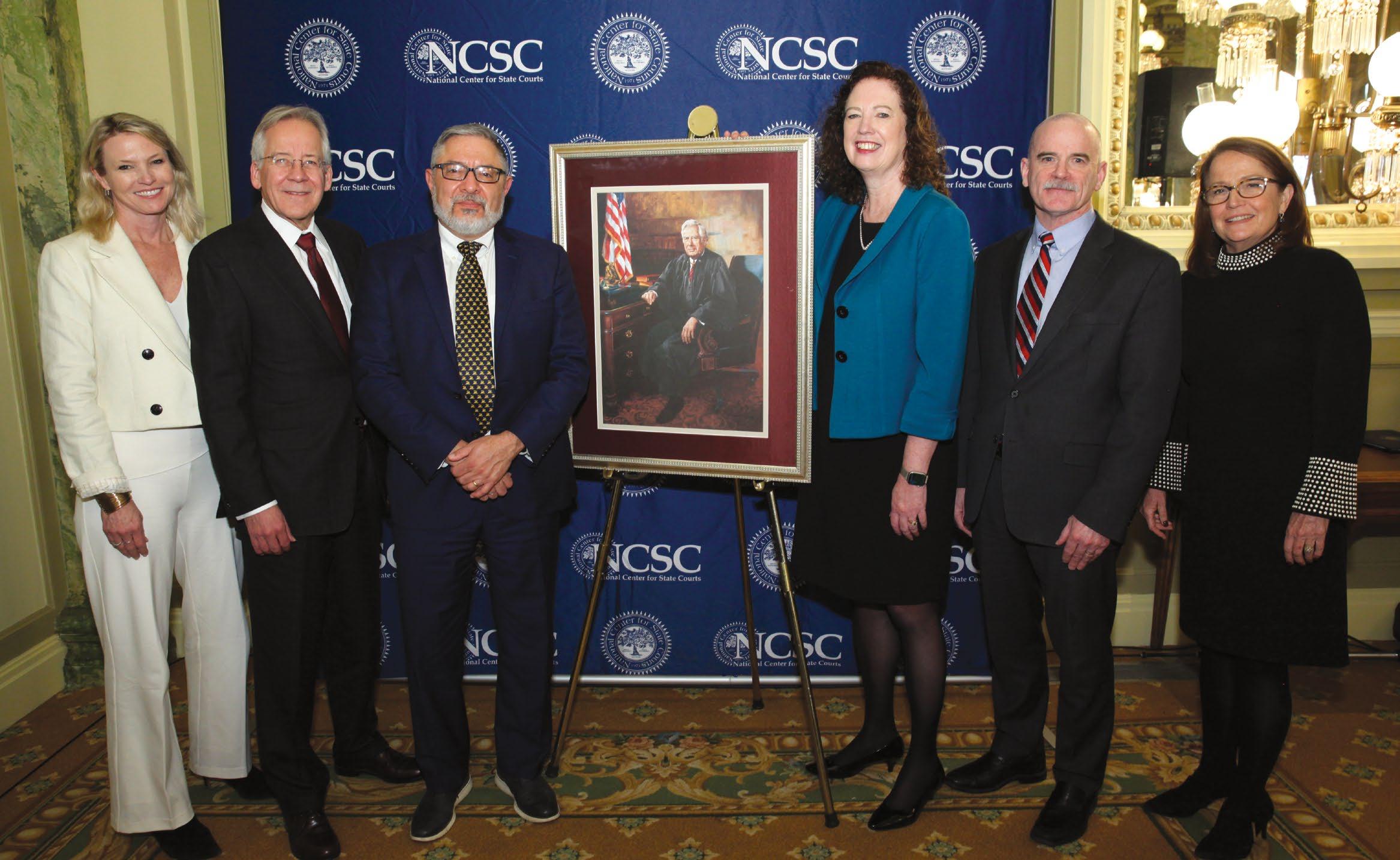
EILEEN FITZGERALD
Former Head of Housing Affordability
Philanthropy from Wells Fargo Foundation
Tacoma Park, Maryland
LAURIE K. GIVENS
Kentucky State Court Administrator
Frankfort, Kentucky
CONSTANDINOS “DENO” HIMONAS
Justice (Retired), Utah Supreme Court
Salt Lake City, Utah
THOMAS C. LEIGHTON
Vice President, Government Relations and Content Acquisition, Legal Editorial Operations for Thomson Reuters
Eagan, Minnesota
JEFFREY P. MINEAR
Counselor to the Chief Justice (Retired), Supreme Court of the United States Washington, D.C.
GENERAL COUNSEL COMMITTEE CHAIRS
The General Counsel Committee of the National Center for State Courts facilitates the intellectual collaboration between the general counsel of America’s leading corporations and NCSC experts on judicial issues that affect the public, the business community, and state court leaders.
MICHAEL J. HOLSTON
Senior Vice President, General Counsel & Chief Compliance Officer
General Electric Company
MARK S. HOWARD
Executive Vice President & Chief Legal Officer
Nationwide Mutual Insurance Company
R. WILLIAM IDE
Of Counsel, Corporate Governance
Akerman LLP
MICHAEL H. LANZA
Executive Vice President, General Counsel & Chief Compliance Officer
Selective Insurance Company of America
THOMAS C. LEIGHTON
RANDALL M. EBNER
Former Vice President & General Counsel
ExxonMobil Corporation
MEMBERS
MICHAEL W. ANDREW
Senior Vice President, General Counsel & Secretary Enterprise Holdings, Inc.
ROBERT A. ARMITAGE
Consultant, IP Strategy & Policy
Eli Lilly and Company (Retired)
JOHN W. ATTEY
Senior Vice President & Chief Legal Officer
Cambia Health Solutions
MARTIN R. BAKER
Senior Vice President, General Counsel & Chief Compliance Officer
The Greenbrier Companies
S. JACK BALAGIA
ExxonMobil Corporation (Retired)
STEVEN P. CROLEY
Chief Policy Officer & General Counsel
Ford Motor Comapny
CHRISTA A. D’ALIMONTE
Executive Vice President, General Counsel & Secretary
Viacom, Inc.
MICHAEL J. HARRINGTON
Former Senior Vice President & General Counsel Eli Lilly and Company
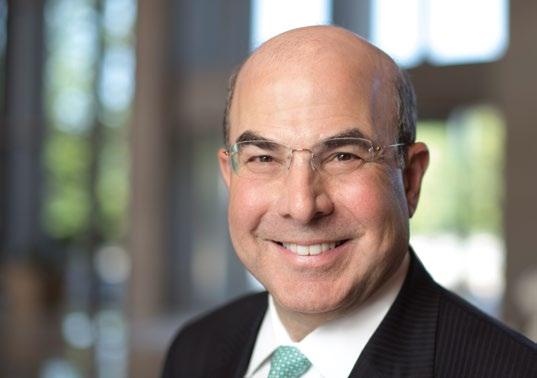
Vice President Government Relations & Content Acquisitions
Thomson Reuters
CHARLES W. MATTHEWS
ExxonMobil Corporation (Retired)
DAVID R. MCATEE
JENNIFER M. DANIELS
Chief Legal Officer & Secretary
Colgate-Palmolive Company
RUSSELL C. DEYO
Johnson & Johnson (Retired)
MICHAEL FREEDMAN General Counsel
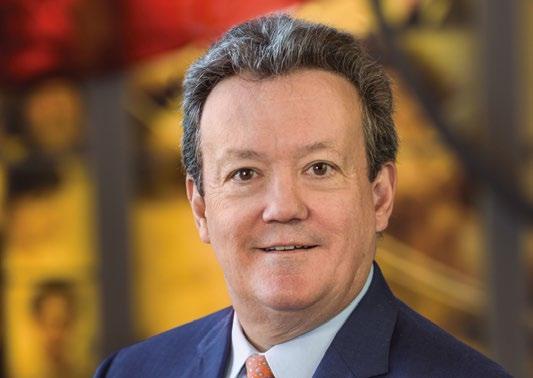
Achieve
CRAIG B. GLIDDEN
Executive Vice President & General Counsel General Motors Company
SAMANTHA HARNETT
General Counsel
Logitech, Inc.
DAMON HART
Executive Vice President & Chief Legal Officer
Liberty Mutual Insurance Company
ANDREW D. HENDRY
Colgate-Palmolive Company (Retired)
Senior Executive Vice President & General Counsel
AT&T, Inc.
STEPHEN MCMANUS
Senior Vice President & General Counsel
State Farm Mutual Automobile Insurance Company
JEFFREY MERIGGI
Chief Business Affairs & Legal Officer
Pretium
LAUREN MOGENSEN
Global General Counsel
Bank of America Corporation
CRAIG S. MORFORD
Vice President & General Counsel
ExxonMobil Corporation
ROBERT H. PATE
Vice President & General Counsel
Chevron Corporation
CRAIG POSSON
Executive Vice President & General Counsel
Great West Casualty Company
20
KEVIN RHODES
Senior Vice President & General Counsel
3M Company
BILL ROBINSON
Corporate Secretary
Geico
TONYA ROBINSON
Vice Chair & General Counsel
KPMG LLP
SANDRA PHILLIPS ROGERS
Group Vice President, General Counsel & Chief Legal Officer
Toyota Motor North America
DEV STAHLKOPF
Executive Vice President & Chief Legal Officer
Cisco Systems, Inc.
JEFF TRUE General Counsel
Zoom
STEPHEN UCCI General Counsel
Hypertherm
MICHAEL H. ULLMANN
Executive Vice President & General Counsel
Johnson & Johnson
JEANNE E. WALKER
Associate General Counsel
Shell Oil Company
SUSAN WHALEY Chief Legal Officer
Procter & Gamble Company
AMY WILSON
General Counsel & Corporate Secretary
Dow Chemical Company
JENNIFER L. ZACHARY
Executive Vice President, General Counsel & Corporate Secretary
Merck & Co., Inc.
TRIBUTE GIFTS
The National Center for State Courts gratefully acknowledges the following honor and memorial gifts received in 2022.
IN MEMORY OF HON. SHIRLEY S. ABRAHAMSON
Zygmont A. Pines
HON. WARREN E. BURGER
Leonora Burger
MAURICE D. GEIGER
Richard B. Hoffman
LOUIS HENTZEN
Sally A. Holewa
HARRY HERMAN
Fred Herman
HON. JUDITH S. KAYE
Zygmont A. Pines
LILLIAN W. LEE
Mickey Collins
EDWIN W. MADEIRA, JR.
D. Dudley Oldham
RANDALL MELBY
Donna M. Melby
WILLIAM O’BRIEN
David K. Boyd
WM. T. “BILL” ROBINSON III
Joan Robinson
DR. RICHARD SAMSEL
Jane M. Samsel
LOUISE SONET
Patricia Evans
DANIEL H. STRAUB
Johnny Tse
KATHERINE T. WILKE
Michael A. Zamperini
IN HONOR OF ALICIA DAVIS
South Carolina Bar
DANIELLE HIRSCH
Alan Fanger
HON. JOHN L. KELLAM
Barbara Harcourt
MARY C. MCQUEEN
Luther J. Battiste III
Thomas W. Ross
Charles R. Schader
NCSC STAFF
Thomas W. Ross
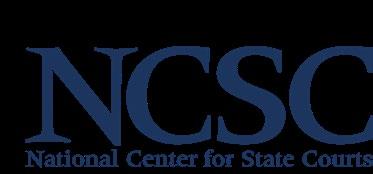
21
Visit ncsc.org for NCSC financial information and past annual reports. NCSC FINANCIAL INFORMATION
LAWYERS COMMITTEE
As officers of the court, lawyers have a special commitment to help improve the performance of state courts for the benefit of their clients and the public. Membership on the NCSC Lawyers Committee furthers this goal. Our members actively engage with the Chief Justices and other court leaders on a range of issues affecting state courts.
CHAIRS
MEMBERS
ROBERT H. ALEXANDER, JR.
The Law Office of Robert H. Alexander
D. L. ASHFORD
Hare Wynn Newell & Newton
CURTIS H. BARNETTE
Skadden Arps Slate Meagher & Flom
PAUL A. BARRETT
Barrett & Gilman
HUNTER M. BARROW
Andrews Myers
DAVID J. BECK
Beck Redden
P. RYAN BECKETT
Butler Snow
MARK A. BEHRENS
Shook Hardy & Bacon
SHEILA L. BIRNBAUM
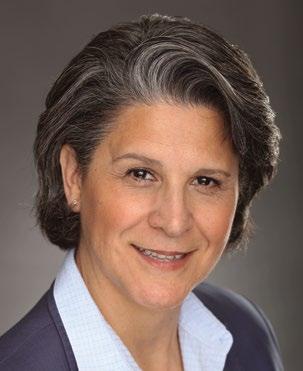
Dechert
DAVID BLEDSOE
Perkins Coie
BILL BLOSS
Koskoff Koskoff & Bieder
BARRY H. BOISE
Troutman Pepper
C. MITCHELL BROWN
Nelson Mullins
DAVID L. BROWN

Hansen McClintock & Riley
REGINALD J. BROWN
Kirkland & Ellis, LLP
BRUCE H. CAHN
Lane Powell
COLIN F. CAMPBELL
Osborn Maledon
DAVID E. CHRISTENSEN
Christensen Law
ERIC CIESIELSKI
State Farm Insurance Companies
MICHAEL V. CIRESI
Ciresi Conlin
FRANKLIN D. CORDELL
Gordon Tilden Thomas Cordell
MARK A. CUNNINGHAM
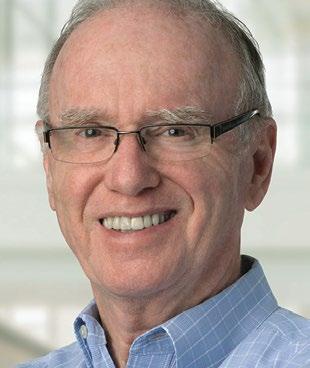
Jones Walker
BARTHOLOMEW J. DALTON
Dalton & Associates
CHRISTINA U. DOUGLAS
Womble Bond Dickinson
MELODY H. EAGAN
Lightfoot Franklin & White
BRUCE W. FELMLY
McLane Middleton
RICHARD C. GODFREY
Kirkland & Ellis
STEPHEN E. GOLDMAN
Robinson & Cole
THOMAS A. GOTTSCHALK
Kirkland & Ellis
MAURICE B. GRAHAM
Gray Ritter & Graham
ROBERT L. HAIG
Kelley Drye & Warren
JANET HOFFMAN
Janet Hoffman & Associates
KAREN G. JOHNSON-MCKEWAN
Orrick Herrington & Sutcliffe
MICHAEL A. KELLY
Walkup Melodia Kelly & Schoenberger
MICHAEL F. KINNEY
Cassem Tierney Adams Gotch & Douglas
THOMAS R. KLINE
Kline & Specter PC
JAMES K. LEADER
Leader Berkon Colao & Silverstein
RICHARD H. LEVENSTEIN
Nason Yeager Gerson Harris & Fumero
JOAN M. LOCKWOOD
Gray Ritter & Graham
MICHAEL P. MAGUIRE
Michael Maguire & Associates
MARK S. MANDELL
Mandell Boisclair & Mandell
JOSEPH R. MARCONI
Johnson & Bell
22
ELENA R. BACA Paul Hastings
PATRICK MALONE Patrick Malone & Associates
ROBERT E. MALONEY JR. Lane Powell
MEMBERSHIP CHAIR
JAMES C. MARTIN
Reed Smith
WAYNE B. MASON
Faegre Drinker Biddle & Reath
DONNA M. MELBY
Paul Hastings
MONICA T. MONDAY
Gentry Locke Attorneys
CORI G. MOORE
Perkins Coie
DAVID R. MORANTZ
Shamberg Johnson & Bergman
ANDRE M. MURA
Gibbs Law Group
GARY P. NAFTALIS
Kramer Levin Naftalis & Frankel
CHARLES M. NOTEBOOM
Noteboom – The Law Firm
THOMAS C. O’BRIEN
Miller Canfield Paddock & Stone
TERENCE O’TOOLE
Starn O’Toole Marcus & Fisher
RONALD L. OLSON
Munger Tolles & Olson
JENNIFER L. PARENT
McLane Middleton
ROBERT S. PECK
Center for Constitutional Litigation
KATHLEEN F. PETERSON
Ciresi Conlin
JOHN T. PRISBE
Venable
F. JAMES ROBINSON, JR.
Hite Fanning & Honeyman
SARA B. ROITMAN
Dechert LLP
DANIEL A. ROTTIER
Habush Habush & Rottier
JOSEPH F. SAVAGE, JR.
Goodwin Procter
YOUNG LAWYERS COMMITTEE
Lawyers Committee members are encouraged to mentor and name a young attorney to serve on the Young Lawyers Committee. State court leaders value the unique perspective and ideas that these members provide during the annual meeting. The Committee’s goal is to engage young lawyers in the substantive work of NCSC while also fostering deeper relationships through networking with other members of the bench and bar.
CHAIRS
MICAH J. FINCHER
Jones Walker
BRANDON HECHTMAN
Wicker Smith
MEMBERS
A. MATTISON BOGAN
Nelson Mullins
MOLLY Q. CAMPBELL
Reed Smith
ALLISON DELAURENTIS
Troutman Pepper
MICHAEL S. FIGENSHAU
Gray Ritter & Graham
CAROLINE B. GIORDANO
Miller Canfield Paddock and Stone
JACOB M. HEATH
Orrick Herrington & Sutcliffe
ZACHARY MANDELL
Mandell Boisclair & Mandell
WILLIAM SAVITT
Wachtell Lipton Rosen & Katz
CHRISTIAN D. SEARCY
Searcy Denney Scarola Barnhart & Shipley
J. D. SMITH
Law Office of J.D. Smith
MICHAEL W. SMITH
CHRISTIAN & BARTON
TODD A. SMITH
Smith LaCien
MYRON T. STEELE
Potter Anderson & Corroon
KATHERINE MARCHANT
Janet Hoffman & Associates
EMILY W. MILLER
Andrew Myers
ALICIA M. PENN
McGuireWoods
MATTHEW PIERCE
Gordon Tilden Thomas Cordell
DANIEL PRINCE
Paul Hastings
ALEX B. ROBERTS
Beck Redden
JUSTIN RUSK
Janet Hoffman & Associates
GENNA S. STEINBERG
Kelley Drye & Warren
SARAH MOTLEY STONE
Womble Bond Dickinson
KRISTEN L. VELA
Ramon Worthington
EZEKIEL S. WALD
Gibbs Law Group
DAVID S. STEUER
Wilson Sonsini Goodrich & Rosati
SAMUEL L. TARRY
McGuireWoods
TYLER S. THOMPSON
Dolt Thompson Shepherd & Conway, PSC
JEFFREY I. TILDEN
Gordon Tilden Thomas Cordell
DAN K. WORTHINGTON
Ramon Worthington
CORRIE YACKULIC
Corrie Yackulic Law
23
2022 HONOR ROLL OF CONTRIBUTORS
The National Center for State Courts is pleased to express our deep appreciation for the generosity of these corporations and law firms.
CORPORATE CONTRIBUTORS
Gifts of $25,000+
BANK OF AMERICA CORPORATION
CISCO SYSTEMS, INC.
EXXONMOBIL CORPORATION
LOGITECH, INC.
TELEVIC
ZOOM VIDEO COMMUNICATIONS
Gifts of $10,000 - $24,999
AT&T, INC.
CHEVRON CORPORATION
ENTERPRISE HOLDINGS, INC.
FORD MOTOR COMPANY
GEICO
GENERAL ELECTRIC COMPANY
HYPERTHERM, INC.
JOHNSON & JOHNSON
KPMG LLP
LIBERTY MUTUAL INSURANCE
MERCK & CO., INC.
SELECTIVE INSURANCE GROUP
SHELL USA, INC.
SPEECH2DATA LLC
STATE FARM INSURANCE
THOMSON REUTERS CORPORATION
Gifts up to $9,999
CAMBIA HEALTH SOLUTIONS
GREAT WEST CASUALTY COMPANY
PROCTER & GAMBLE COMPANY
LAW FIRM CONTRIBUTORS
JUSTICE CIRCLE
Gifts of $5,000 - $9,999
BECK REDDEN
CIRESI CONLIN
GENTRY LOCKE
GORDON TILDEN THOMAS
CORDELL
KIRKLAND & ELLIS
MUNGER TOLLES & OLSON
NASON YEAGER GERSON
HARRIS & FUMERO
NELSON MULLINS
PAUL HASTINGS
REED SMITH
SEARCY DENNEY SCAROLA
BARNHART & SHIPLEY
SMITH LACIEN
WALKUP MELODIA KELLY & SCHOENBERGER
WILSON SONSINI GOODRICH & ROSATI FOUNDATION
AMICUS CIRCLE
Gifts of $3,000 - $4,999
ANDREW MYERS
BUTLER SNOW
CHRISTENSEN LAW
CORRIE YACKULIC LAW
DECHERT
DOLT THOMPSON SHEPHERD & CONWAY
FAEGRE DRINKER BIDDLE & REATH
GIBBS LAW GROUP
GRAY RITTER & GRAHAM
HABUSH HABUSH & ROTTIER
HANSEN MCCLINTOCK & RILEY
HITE FANNING & HONEYMAN
JANET HOFFMAN & ASSOCIATES
JOHNSON & BELL
KLINE & SPECTER
KOSKOFF KOSKOFF & BIEDER
KRAMER LEVIN NAFTALIS & FRANKEL
LANE POWELL
LAW OFFICE OF J.D. SMITH
LAW OFFICE OF ROBERT H. ALEXANDER JR.
LIGHTFOOT FRANKLIN & WHITE
MANDELL BOISCLAIR & MANDELL
MICHAEL P. MAGUIRE & ASSOCIATES
ORRICK HERRINGTON & SUTCLIFFE
OSBORN MALEDON
PATRICK MALONE & ASSOCIATES
PERKINS COIE
POTTER ANDERSON & COROON
RAMON WORTHINGTON
ROBINSON & COLE
SHAMBERG JOHNSON & BERGMAN
SHOOK HARDY & BACON
STARN O’TOOLE MARCUS & FISHER
STATE FARM INSURANCE
TROUTMAN PEPPER
VENABLE
WOMBLE BOND DICKSON
Gifts up to $2,999
BARRETT & GILMAN
CENTER FOR CONSTITUTIONAL LITIGATION
CHRISTIAN & BARTON
KELLEY DRYE & WARREN
MCLANE MIDDLETON
24
PROJECT FUNDING
We are grateful for the many foundations, organizations, and government agencies that support our projects in the state courts and courts around the world.
FOUNDATIONS
CASEY FAMILY PROGRAMS
JOHN D. AND CATHERINE T. MACARTHUR FOUNDATION
JPB FOUNDATION
THE PEW CHARITABLE TRUSTS
BANK OF AMERICA CHARITABLE FOUNDATION
GOVERNMENT
JOAN K. COCHET MEMORIAL SCHOLARSHIP
OPEN SOCIETY FOUNDATION
MELVILLE CHARITABLE TRUST
WELLS FARGO FOUNDATION
OHIO STATE BAR FOUNDATION
W.K. KELLOGG FOUNDATION
SOZOSEI FOUNDATION
ADMINISTRATIVE OFFICE OF THE UNITED STATES COURTS
EXECUTIVE OFFICE OF IMMIGRATION REVIEW
NATIONAL SCIENCE FOUNDATION
STATE JUSTICE INSTITUTE
U.S. DEPARTMENT OF JUSTICE, OFFICE OF JUSTICE PROGRAMS
BUREAU OF JUSTICE ASSISTANCE
NATIONAL INSTITUTE OF JUSTICE
OFFICE FOR VICTIMS OF CRIME
OFFICE ON VIOLENCE AGAINST WOMEN
U.S. DEPARTMENT OF TRANSPORTATION
COMMERCIAL DRIVER’S LICENSE PROGRAM IMPROVEMENT
FEDERAL MOTOR CARRIER SAFETY ADMINISTRATION
U.S. DEPARTMENT OF STATE
BUREAU OF COUNTERTERRORISM
BUREAU OF DEMOCRACY, HUMAN RIGHTS, AND LABOR
BUREAU OF INTERNATIONAL NARCOTICS AND LAW ENFORCEMENT AFFAIRS
BUREAU OF NEAR EAST AFFAIRS
OTHER
AMERICAN ACADEMY OF ADDICTION PSYCHIATRY (AAAP)
AMERICAN BOARD OF TRIAL ADVOCATES (ABOTA)
CENTER FOR EFFECTIVE PUBLIC POLICY
THE COUNCIL OF STATE GOVERNMENTS
DAI GLOBAL
JUSTICE STUDIES CENTER OF THE AMERICAS
KLEINFELDT MYCHAJLOWYCZ ARCHITECTS, INC.
NATIONAL ASSOCIATION FOR COURT MANAGEMENT
NATIONAL ASSOCIATION OF CRIMINAL DEFENSE LAWYERS
NATIONAL ASSOCIATION OF DRUG COURT PROFESSIONALS
NATIONAL CONGRESS OF AMERICAN INDIANS
NATIONAL DISTRICT ATTORNEYS ASSOCIATION (NDAA)
NIGERIA NATIONAL JUDICIAL COUNCIL PAE PROFESSIONAL SERVICES
PRETIUM
THE RAND CORPORATION
RTI INTERNATIONAL RULO STRATEGIES, LLC
SEARCH, THE NATIONAL CONSORTIUM FOR JUSTICE INFORMATION AND STATISTICS
UNITED NATIONS DEVELOPMENT PROGRAMME
The National Center for State Courts recognizes the following individuals who made a gift to the Joan K. Cochet Memorial Scholarship for the Institute for Court Management (ICM). The scholarship helps deserving students achieve the status of ICM Fellow — the highest level of ICM’s certification program.
HOWARD H. BERCHTOLD, JR.
CHRISTOPHER G. BLEUENSTEIN
JANET G. CORNELL
JUDE DEL PREORE
SUE K. DOSAL
PATRICIA EVANS
GORDON M. GRILLER
KRISTIAN HEDINE
SALLY A. HOLEWA
EILEEN A. KATO
GREGORY E. MIZE
MARLA S. MOORE
CAROLYN PROBST
KAREN L. PROCHNIEWSKI
MARCUS AND ANITA
REINKENSMEYER
MANDY SARKISSIAN
JEFFREY L. SCHRADE
LINDA R. SOLES
MARCI K. TAETS
ROBERT D. WESSELS
25
Gifts of $5,000 or more
ELENA R. BACA
S. JACK BALAGIA, JR.
BARRY P. BARBASH
DAVID J. BECK
REGINALD J. BROWN
CUMMINS-LEVENSTEIN CHARITABLE FOUNDATION
DEYO FAMILY CHARITABLE FUND
RANDALL M. EBNER
SIMON M. LORNE
JOAN ROBINSON
THOMAS W. ROSS
CHRISTIAN D. SEARCY
PATRICIA A. STANLEY
Gifts of $2,500-$4,999
CURTIS H. BARNETTE
HUNTER M. BARROW
DAVID L. BROWN
MICHAEL L. BUENGER
MICHAEL V. CIRESI
RICHARD C. GODFREY
JOAN M. LOCKWOOD
MICHAEL P. MAGUIRE, ESQ.
MARK S. MANDELL
JAMES C. MARTIN
DONNA M. MELBY
ELIZABETH N. MULVEY
DANIEL A. ROTTIER
J. D. SMITH
MYRON T. STEELE
TYLER S. THOMPSON
CORRIE YACKULIC
The Friends of the Court supports our mission to promote the rule of law and improve the administration of justice in state courts and internationally. These contributions enable NCSC to provide quality training and education, independent research, and to promote awareness of issues surrounding the administration of justice. NCSC gratefully acknowledges the following supporters who made a gift in 2022.
Gifts of $1000-$2,499
JEFF A. APPERSON
THE BLAND FAMILY CHARITABLE FUND
BOBBE AND JON BRIDGE
LINDA R. CAVINESS
ALICIA DAVIS
CHRISTOPHER W. DELL
GORDON M. GRILLER
ROBERT L. HAIG
PAULA HANNAFORD-AGOR
PAMELA Q. HARRIS
MICHAEL G. HEAVICAN
THE R. WILLIAM IDE CHARITABLE FUND
MICHAEL H. LANZA
MELANIE G. MAY
MARY C. MCQUEEN
DAN MOZENA
JESSE RUTLEDGE
TOKO SERITA
GERALD W. VANDEWALLE
ERICA R. YEW
Gifts of $500-$999
ROBERT A. ARMITAGE
LUTHER J. BATTISTE III
HOWARD H. BERCHTOLD, JR.
RUSSELL R. BROWN III
PAMELA CASEY
PATRICIA A. CHAUVIN
RICHARD R. CLIFTON
BRENT E. & JAN AIKMAN DICKSON
LEONARD P. EDWARDS
THOMAS A. GOTTSCHALK
GREACEN ASSOCIATES
NATHAN L. HECHT
SALLY A. HOLEWA
MOLLY JUSTICE
STEPHEN MCMANUS
JOHN AND SUSAN MINTON
MARLA S. MOORE
EDWARD W. MULLINS, JR.
PAUL L. REIBER
JANE M. SAMSEL
CHARLES R. SCHADER
THOMAS E. SCHULZ
RICHARD SCHWERMER
DAVID W. SLAYTON
NAN G. WALLER
Gifts of $250-$499
TARA BLAIR
DAVID AND NANCY BOYD
COLORADO JUDICIAL PERFORMANCE COMMISSION-7TH DISTRICT
J. PETER COOLSEN
MATTHEW B. DURRANT
JULIA EDWARDS-MCDANIEL
ALAN FANGER
GIUSEPPE M. FAZARI
DAVID E. GILBERTSON
KARL R. HADE
DANIEL J. HALL
JAMES M. HARRIS
J. GARY HASTINGS
TIMOTHY M. HUGHES
JAMES F. MCHUGH
EILEEN A. KATO
JOHN R. MEEKS
NORMAN H. MEYER, JR.
GREGORY E. MIZE
JUDY PERRY MARTINEZ
MARCUS AND ANITA REINKENSMEYER
LORETTA H. RUSH
DENNIS J. SMITH
DAVID C. STEELMAN
SAMUEL L. TARRY
KONSTANTINA VAGENAS
ALVIN WEISS
MONIA ZGARNI
26
Gifts of $100-$249
RONALD B. ADRINE
DAVID BARTEE
DOUGLAS R. BEACH
PAUL P. BIEBEL, JR.
CHRISTOPHER G. BLEUENSTEIN
KEVIN J. BOWLING
LEONORA BURGER
CAMERON S. BURKE
PAMELA BURTON
CHARLES F. CAMPBELL
PAULA M. CAREY
ALAN CARLSON
WILLIAM CARPENTER
EDWARD C. CLIFTON
MICKEY COLLINS
TERI DEAL
JUDE DEL PREORE
SARA B. DAVIES FUND
EDWARD F. DIDONNA
SUE K. DOSAL
SUSAN L. FORMAKER
VALERIE F. GARDNER
JAMES A. GAZELL
KRISTIAN HEDINE
FRED HERMAN
MARTA E. HERNANDEZ
RICHARD B. HOFFMAN
MARY T. HOGAN
L. M. JACOBS IV
WILLIAM G. KELLY
DALE R. KOCH
MILTON L. MACK, JR.
DEBORAH A. MASON
RAY MCKOSKI
JAMES E. MCMILLAN
BARBARA R. MUNDELL
GAYLE A. NACHTIGAL
JOHN T. NOCKLEBY
D. DUDLEY OLDHAM
BRIAN J. OSTROM
EDUARDO PADRO
STEVEN F. PFLAUM
RICHARD J. PIERCE
ZYGMONT A. PINES
CAROLYN PROBST
KAREN L. PROCHNIEWSKI
STUART & DEBORAH RABNER CHARITABLE FUND
JANET REID
RUSSELL K. RICHARDSON
RISING UP, LLC
RONALD B. ROBIE
DIANE ROBINSON
LEE ANN RUSSO
MANDY SARKISSIAN
GREGORY L. SATTIZAHN
JEFFREY L. SCHRADE
MARK SCHUERING
STACEY A. SMITH
SOUTH CAROLINA BAR
JOHN M. STEADMAN
NORA E. SYDOW
MARCI K. TAETS
SUZANNE K. TALLARICO
PATRICIA TOBIAS
ALAN J. TOMKINS
RONALD D. WARFIELD
MARK A. WEINBERG
MICHAEL A. ZAMPERINI
Every effort has been made to list current and accurate information. If you see an error or omission, we would like to hear from you at development@ncsc.org.
Gifts up to $99
DAVID ANDERSON
JENNIFER D. BAILEY
ROBERT N. BALDWIN
TERESA A. BEAUDET
EPHANIE A. BLAIR
ELIZABETH C. BLAKE
DAVID A. CABLE
LAVOLIA E. DUNCAN
PATRICIA EVANS
SUSAN GILLIAM
JENNIFER L. HAIRE
BARBARA HARCOURT
CHERILYN HUGHES
YVONNE T. JONES
LAURA G. KLAVERSMA
NINGXIN LI
BROOKE H. MEYER
SHELLEY R. ROCKWELL
SHANNON ROTH
NANCY M. SILLERY
ELENI Y. SNYDER
LINDA R. SOLES
SHAUNA M. STRICKLAND
CHARLOTTE K. SUGG
JOHNNY TSE
CINDI L. WELDY
BRENDA A. WILLIAMS
CHERYL L. WRIGHT
CHANG-MING YEH
The National Center for State Courts established the Presidents Legacy Society in honor of its four presidents — Edward B. McConnell, Larry L. Sipes, Roger K. Warren, and Mary C. McQueen — to honor and celebrate donors who provide legacy gifts to help NCSC to fulfill its mission of promoting the rule of law and improving the administration of justice in state courts and courts around the world.
TRUSTED LEADERSHIP. PROVEN SOLUTIONS. BETTER COURTS.

Published April 2023. © 2023 National Center for State Courts ncsc.org/annualreport










 By Circuit Judge Nan G. Waller Multnomah County, Oregon
By Circuit Judge Nan G. Waller Multnomah County, Oregon



























